How to Make Quora Work for Your Business (And Win in AI Search)
Semrush looked at 26,000 Quora URLs showing up in Google’s AI search, and the pattern was obvious: real, lived experience beats keyword stuffing every time. Here’s what the data says about why Quora content surfaces and how brands can use those insights to show up stronger across AI search.

I've been using Quora for years as my go-to for practical answers and occasional late-night entertainment.
There’s something oddly satisfying about reading what strangers from around the world have to say on various obscure topics.
But lately, Quora has been getting a lot more attention because Google's prioritizing it in its AI search features — alongside platforms like Reddit and other community-driven sites.
This trend prompted our team at Semrush to analyze 26,000 Quora URLs cited in Google AI Mode.
I then sat down with Quora's team to understand what makes certain content more likely to appear in AI results and get featured by the platform’s algorithm.
What is Quora and how does it work?
Quora is a question-and-answer platform where users ask questions, provide answers, and engage with content through upvotes, comments, and shares.
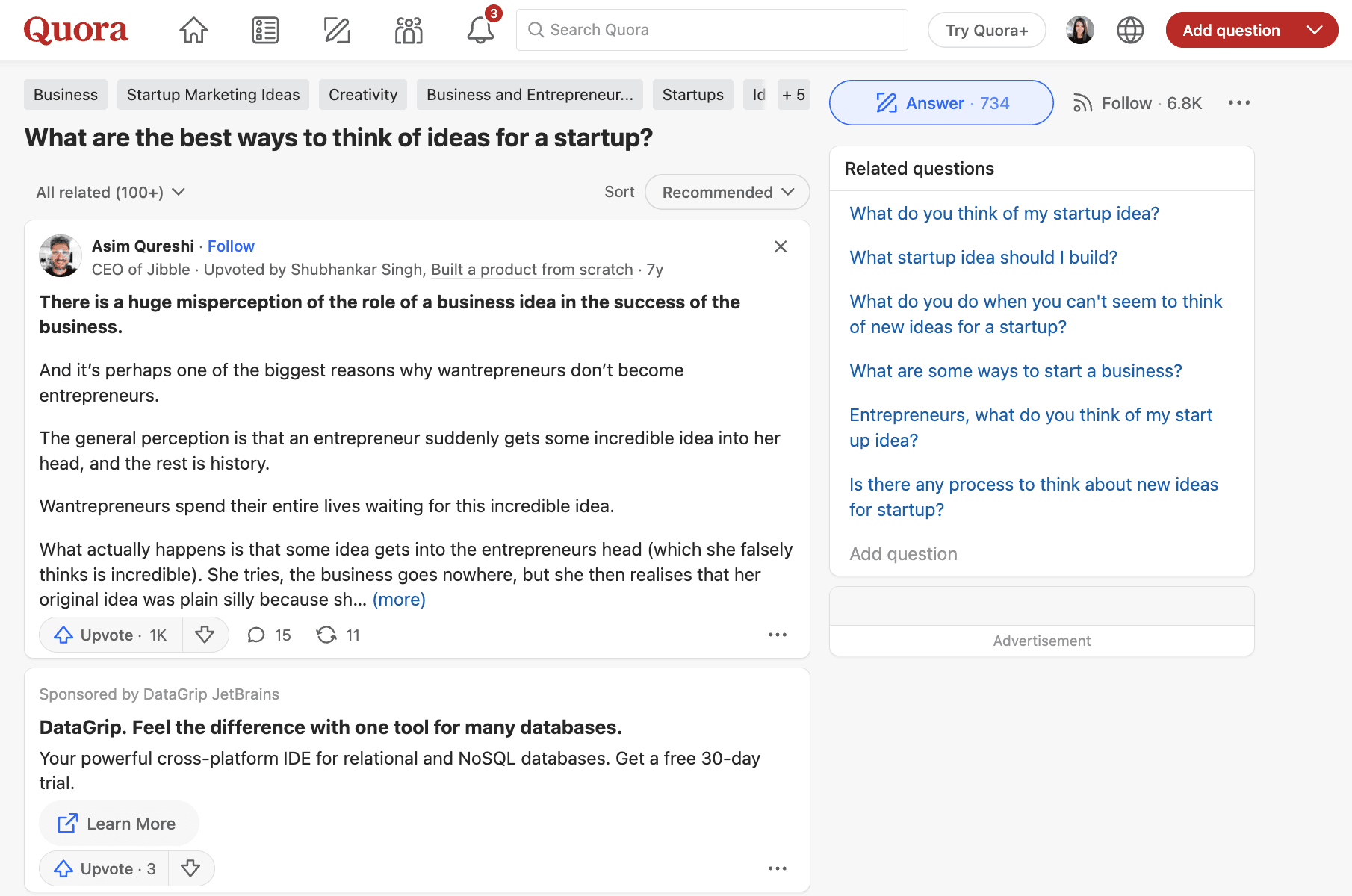
It operates on a simple but powerful knowledge flywheel that keeps content valuable over time.
First, the platform connects people seeking information with those who have expertise or experience on specific topics.
Then, community voting mechanisms highlight the most helpful responses.
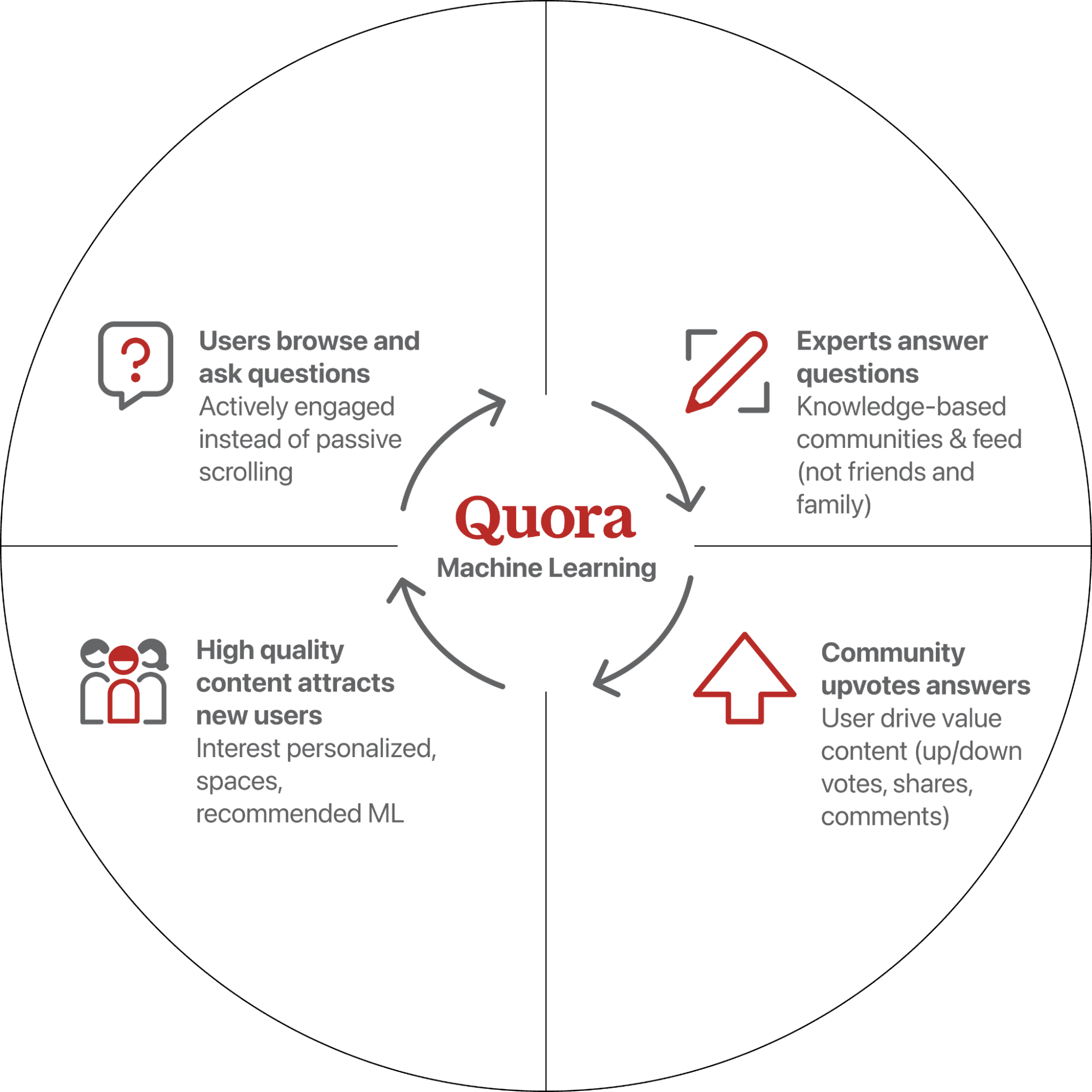
What makes it especially curious?
Unlike social media where posts quickly disappear, answers on Quora remain discoverable indefinitely.
Why Quora matters for businesses
Quora is your ticket to both direct audience engagement and AI search visibility.
On the one hand, it has over 400 million monthly active users, meaning businesses can appear right when customers ask questions. That’s why I’ve been writing about using Quora for customer research and engagement since 2019.
On the other hand, it’s now cited in 7.25% of Google AI Mode answers and ranks as the most-cited domain in AI Overviews. Meaning that being active on Quora gives you a chance to rank higher in search.
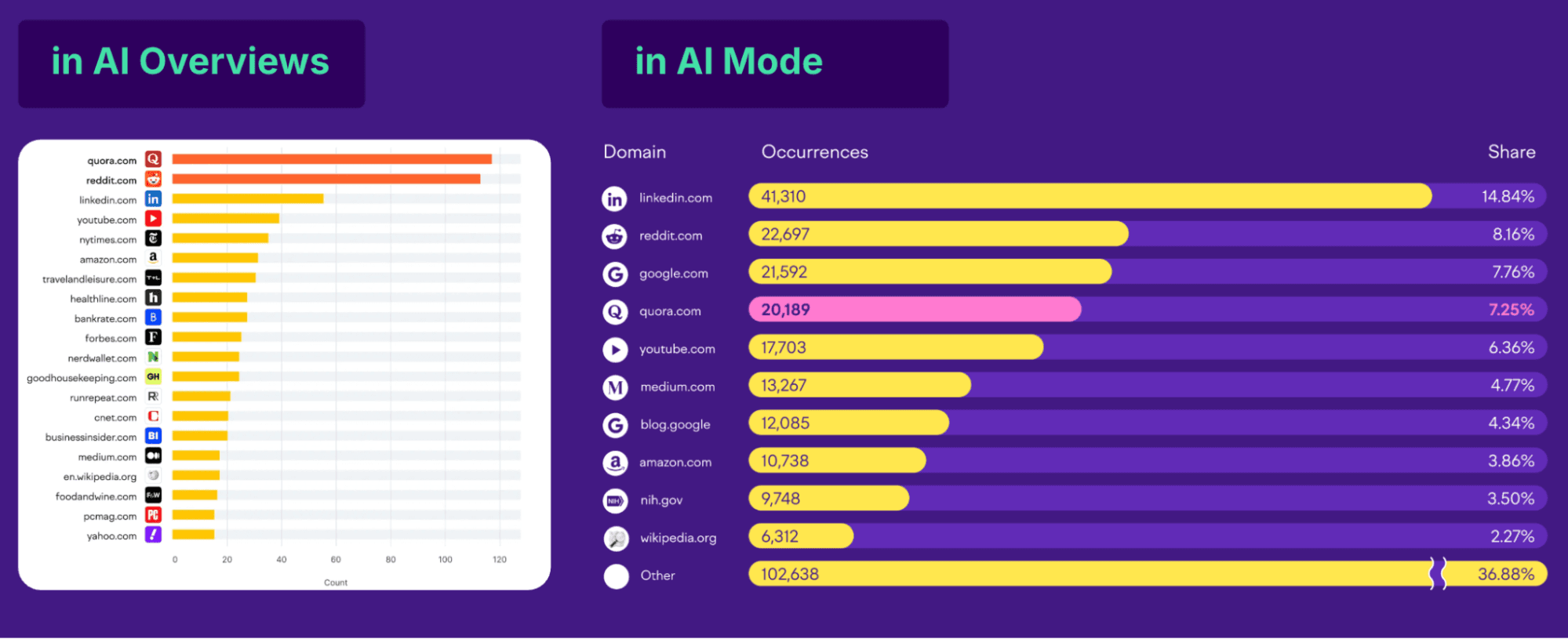
This dual impact happens because Quora delivers what both humans and AI systems value: credible, experience-based answers from real people.
To sum it all up, being present on this platform helps you with:
- AI visibility: Increases chances of appearing in Google's AI features
- Thought leadership: Establishes expertise through direct, helpful answers
- Audience insights: Reveals common questions and misconceptions in your market
- Long-term traffic: Helps you get qualified site visitors for months or years (even if at a smaller scale)
How Google’s AI Mode Features Surface Quora Content
Our analysis of 26,000 Quora URLs cited in Google AI Mode revealed four key patterns that determine visibility.
The key?
Just like on other community platforms, you need to play by Quora’s rules and focus on providing real value with your content.
1. Topic alignment matters more than keyword matching
Google's AI doesn't look for exact phrase matches when citing Quora content — it focuses on answers that address the underlying question, regardless of terminology.
The similarity between search queries and Quora question titles averaged only 0.1 in our study.

The takeaway: Focus on addressing the question's intent rather than optimizing for specific keywords — a trend we’re also seeing in traditional SEO.
2. Content gets synthesized rather than quoted directly
Google creates new answers by blending multiple Quora responses instead of copying any single one verbatim.
Our analysis found only 0.43 similarity between AI responses and original answers.

The takeaway: Structure your answers with distinct points and concrete examples that can be extracted and reused, phrase your point in clear language, and answer more questions to get picked up by Google’s AI.
3. Quora's internal quality rating strongly predicts AI visibility in Google AI Mode
Following Quora's content guidelines increases your chances of appearing in AI results.
Nearly 90% of the cited answers we analyzed were marked "Most Relevant" by Quora's algorithm.
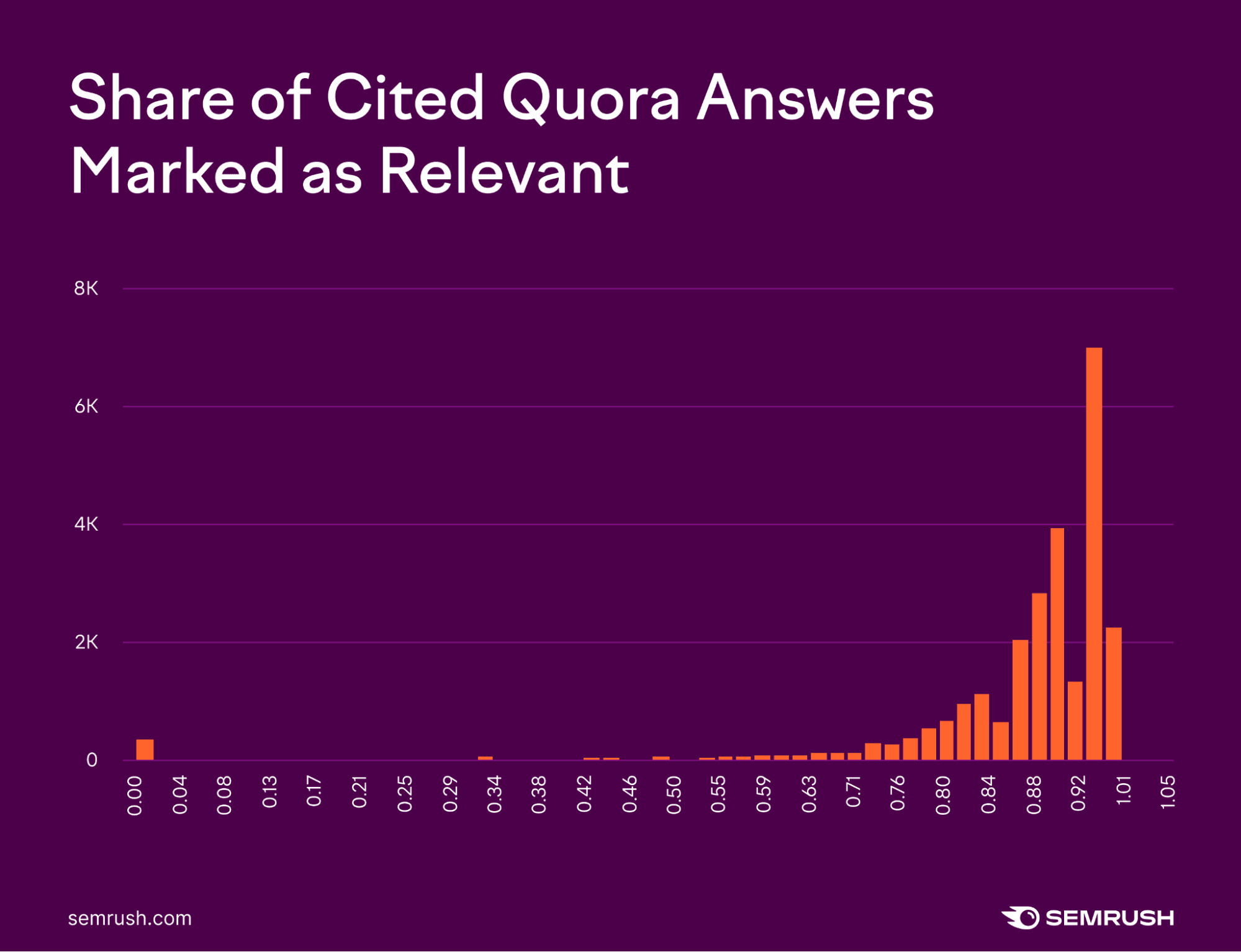
The takeaway: Prioritize Quora's best practices for relevance to maximize your chances of being featured (keep reading to learn more).
4. Community engagement significantly boosts citation chances
Answers that generate meaningful discussion have higher visibility in AI search features.
Threads cited by AI Mode averaged 37 replies and 15 upvotes, suggesting active conversations signal valuable content worth featuring. Your company size might also dictate the strategy.
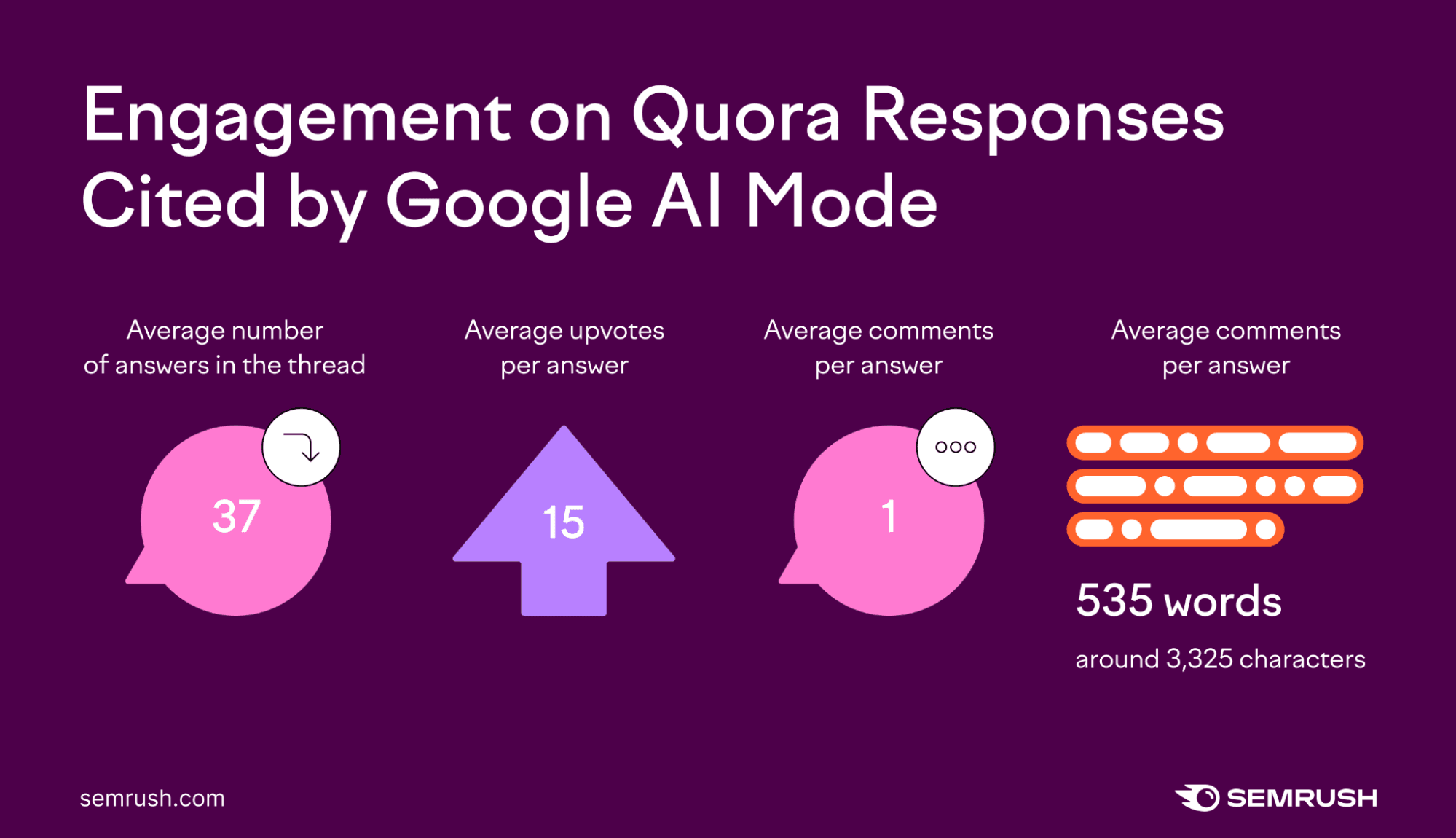
The takeaway: Create answers that invite discussion and actively engage with comments to boost visibility.
Which brands benefit most from Quora marketing?
Virtually any business can leverage Quora, but your specific goals and context will shape how you approach the platform.
For example, tech, SaaS, marketing, and finance categories often see high engagement on Quora, with users actively seeking detailed advice and comparisons.
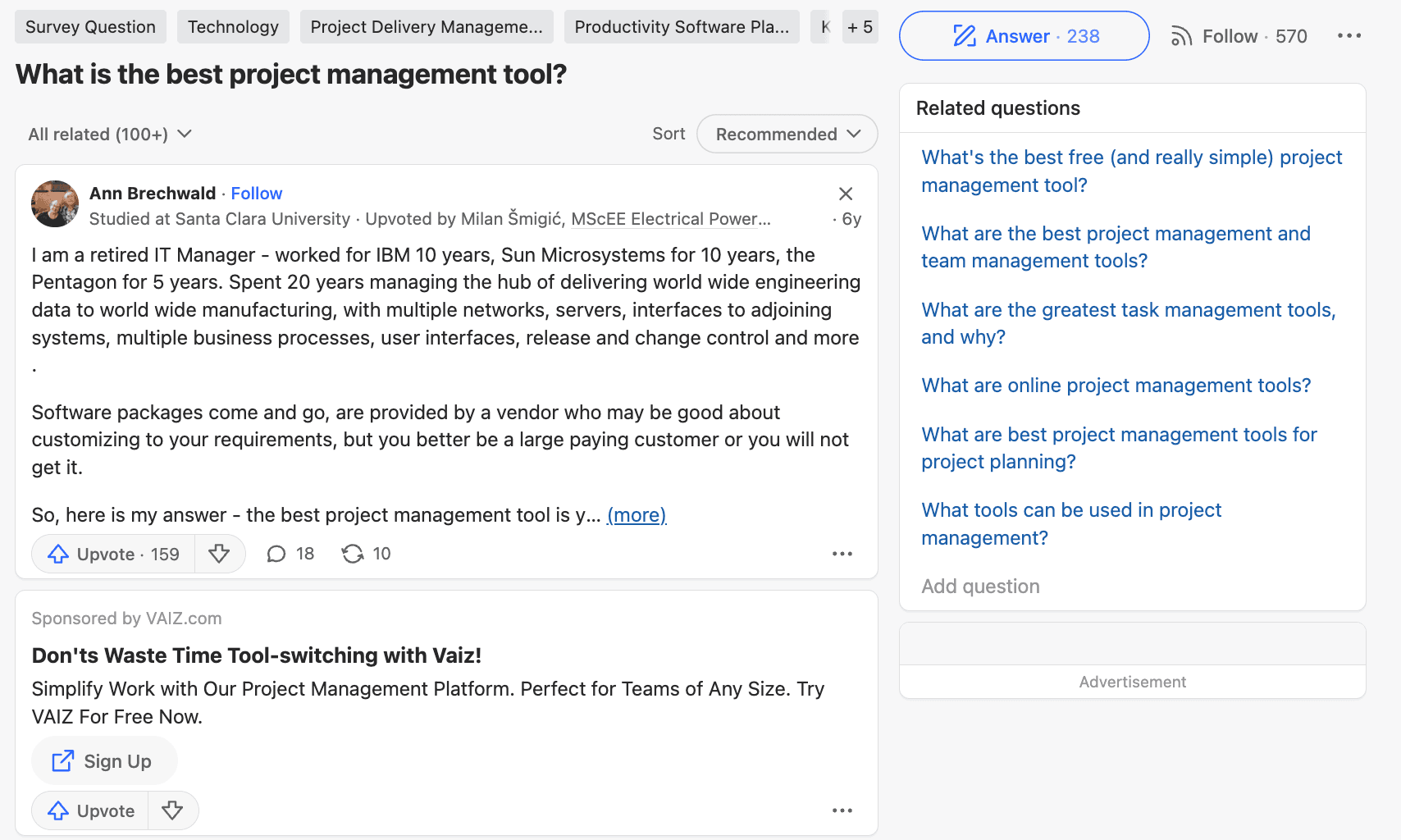
However, consumer brands in lifestyle, food, travel, entertainment, etc., also find traction with people researching everyday questions and looking for advice on how to find, use, and compare products and services.
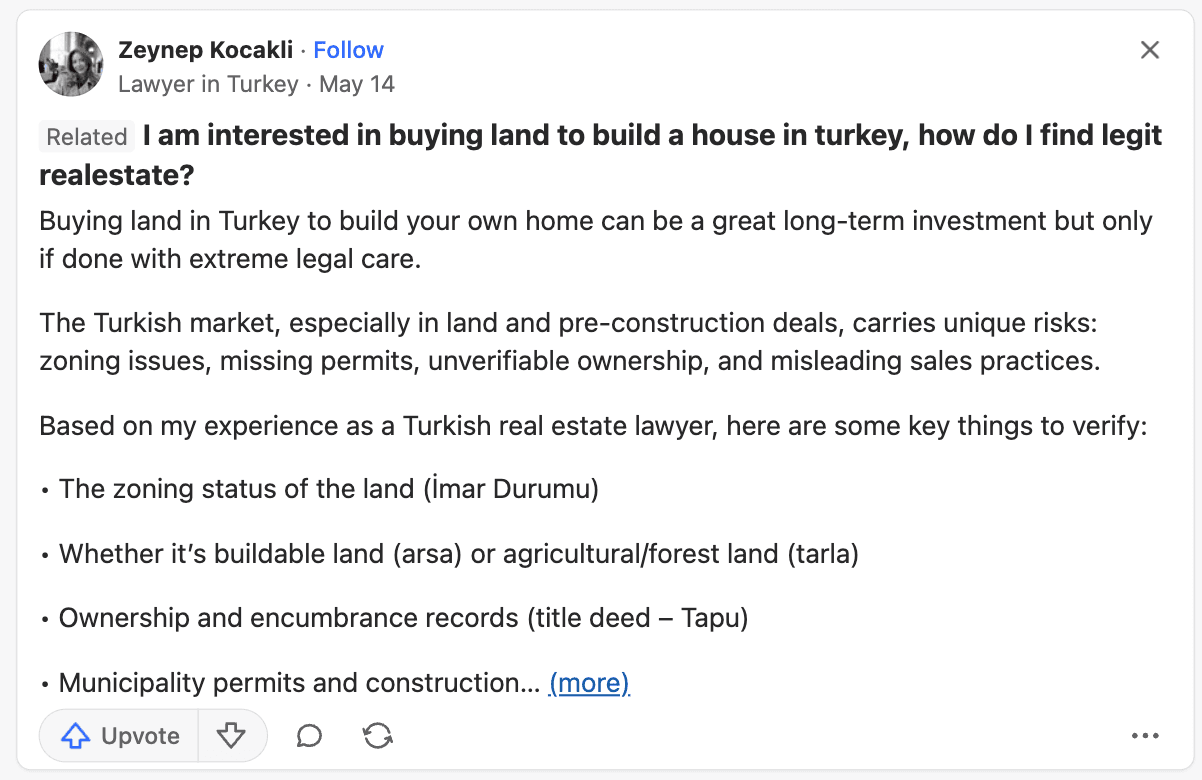
Your company size might also dictate the strategy.
For example, smaller businesses can focus on questions where their specialized knowledge gives them an edge and build trust with customers in their sector.
This works because they can compete on knowledge rather than marketing budget, establishing credibility in areas that larger companies might consider too niche to focus on.
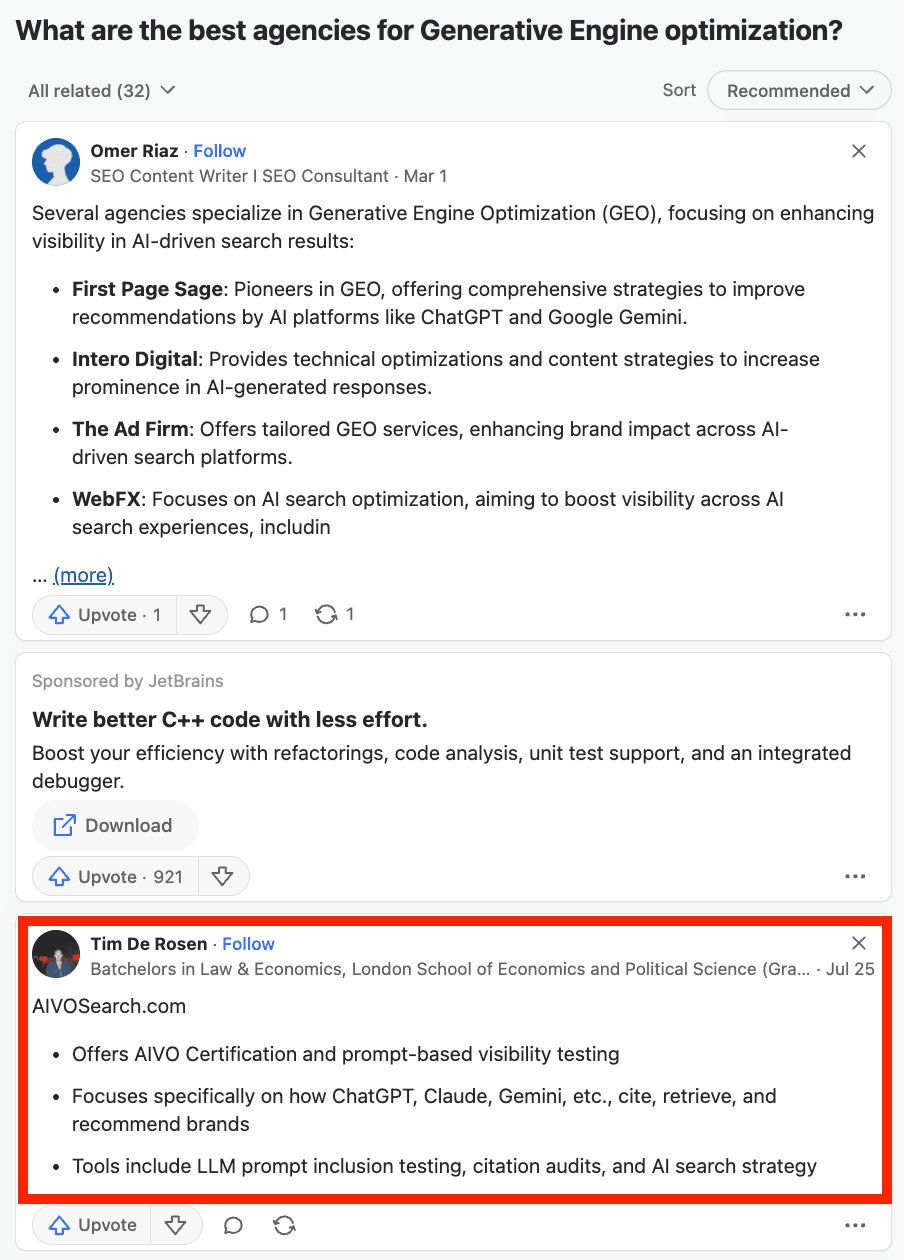
Enterprise companies often use a more coordinated approach with multiple experts answering questions, monitoring brand mentions, and answering brand-specific questions.
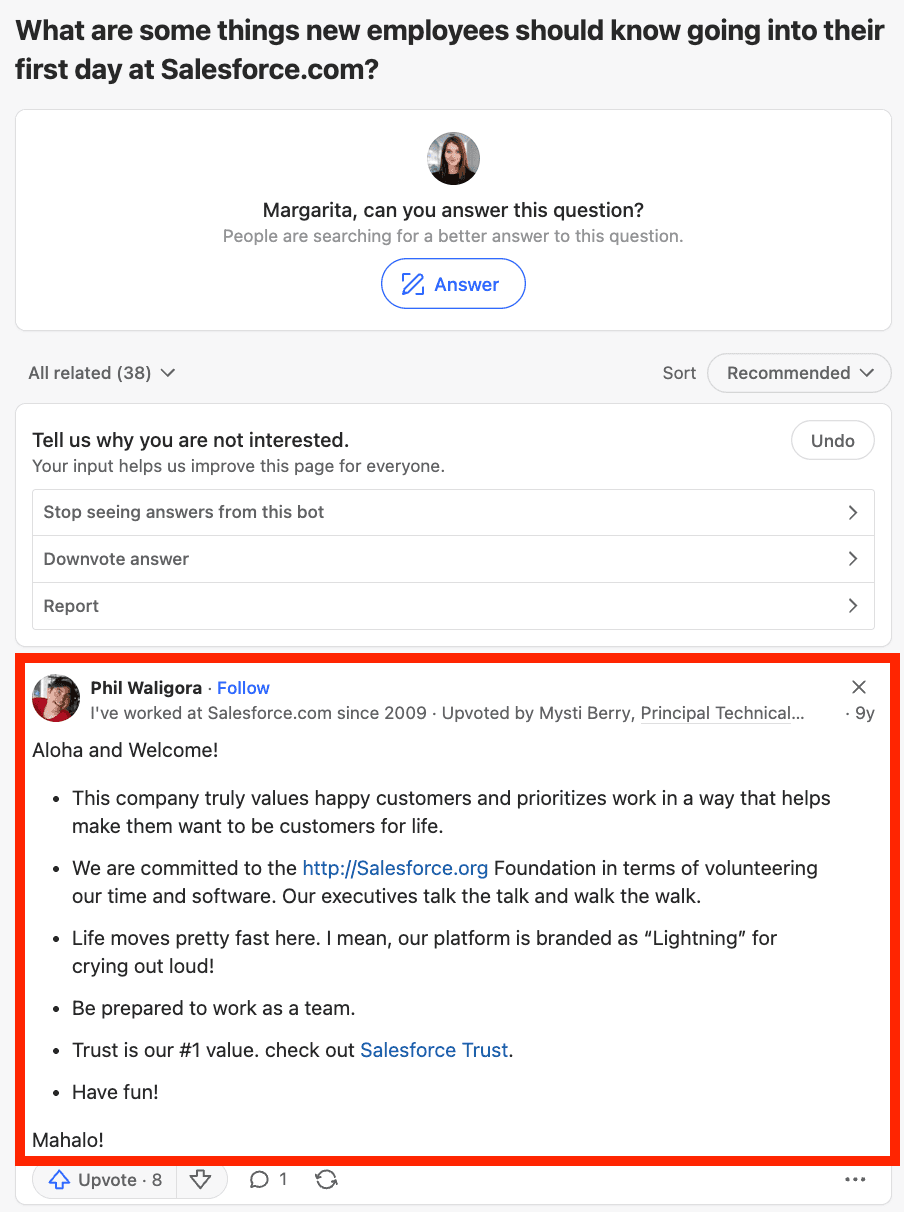
How to start using Quora for your business
So, how can a business use Quora effectively?
I sat down with Jenna Owens, Quora's Customer Success Manager, to get the inside track on what drives results.
"People buy from people. And that sales path is not linear anymore. People are engaging with product experts, with specialists within a company, long before they buy. Quora is a fantastic place to do that."
Let’s look at the specific steps you need to take.
1. Combine personal and brand accounts
Start by establishing both personal and official brand presence on Quora for maximum impact.
This dual approach works because audiences trust individual expertise while also seeking official information from brands:
- Individual accounts (your company’s founder, C-suite, employees): Build personal credibility, appear authentic, and engage in meaningful discussions.
- Business profiles: Provide customer support, share success stories/testimonials, and boost brand trust.
For example, Dustin Moskovitz, CEO of Asana, has a very active presence on Quora with over 58,000 followers.
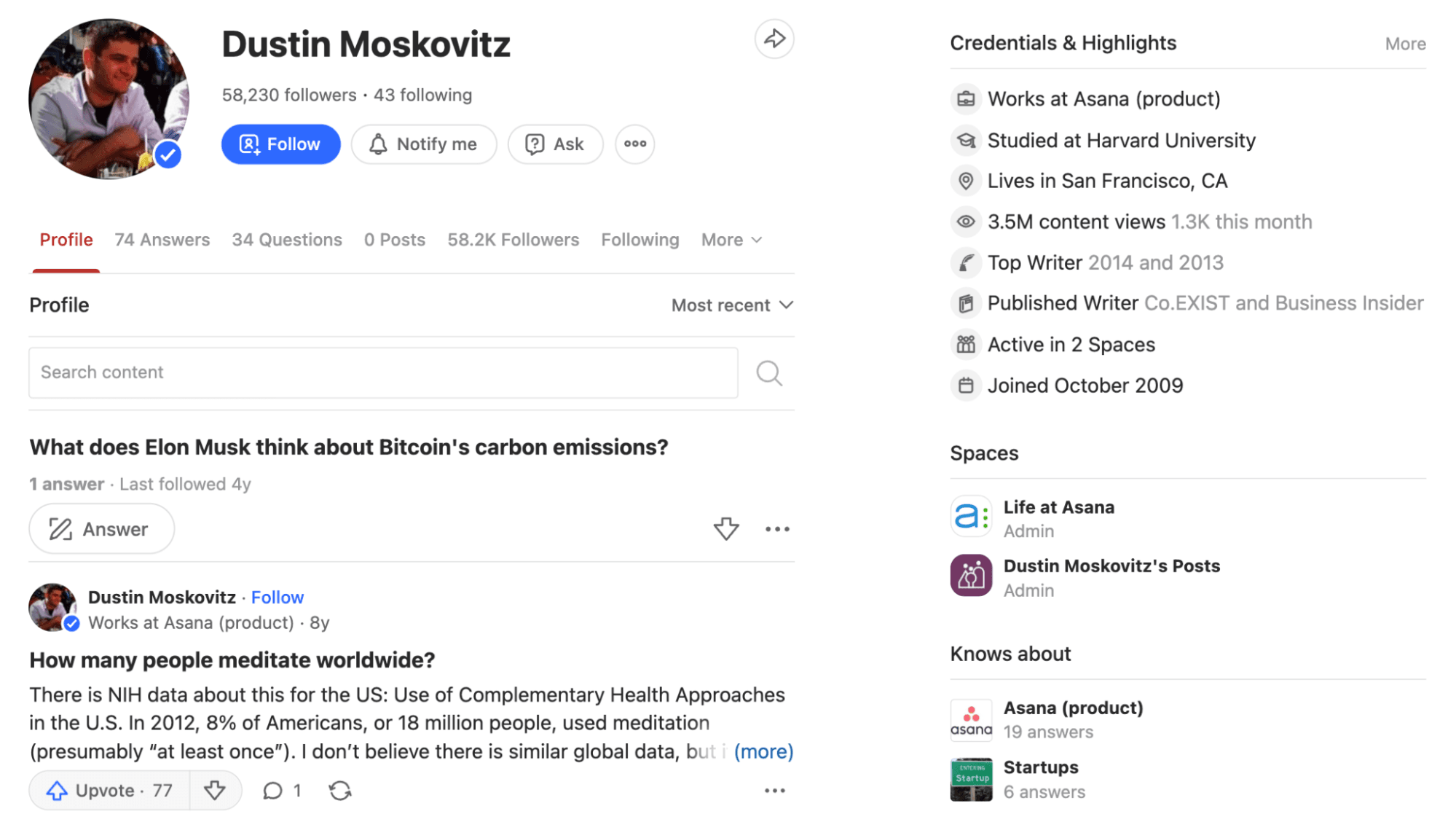
At the same time, Asana maintains its own branded profile:
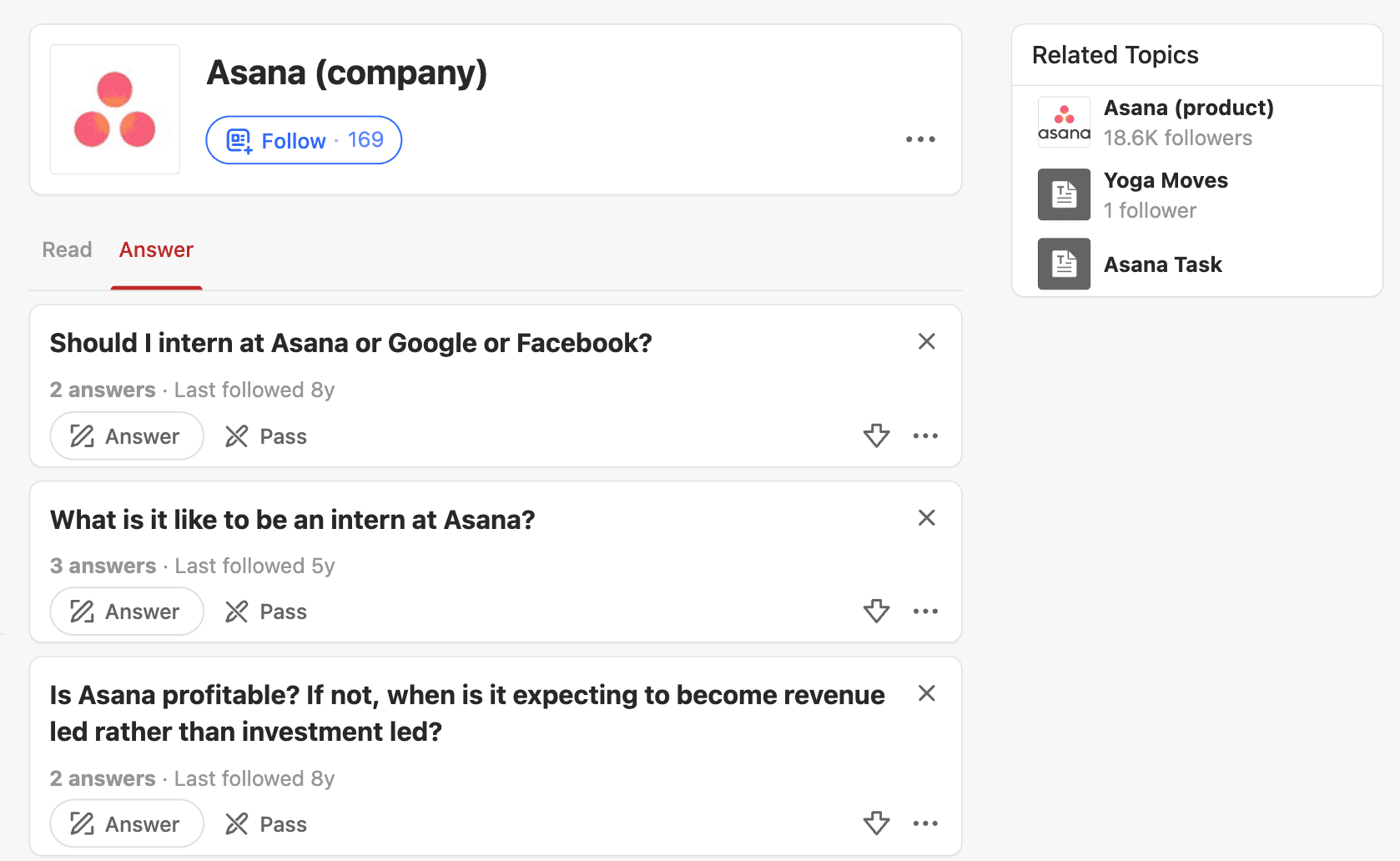
2. Set up your Quora profile
Next, optimize your Quora profile with professional elements that establish credibility from the first impression:
- Upload a quality headshot or business logo and write a concise credential line (e.g., "20 years of experience in SaaS sales").
- Include a short bio explaining who you are, your background, and your expertise.
- Add topics you are knowledgeable about so your answers appear in relevant feeds.
For example, Dustin’s profile highlights his work experience, education, and areas of expertise.
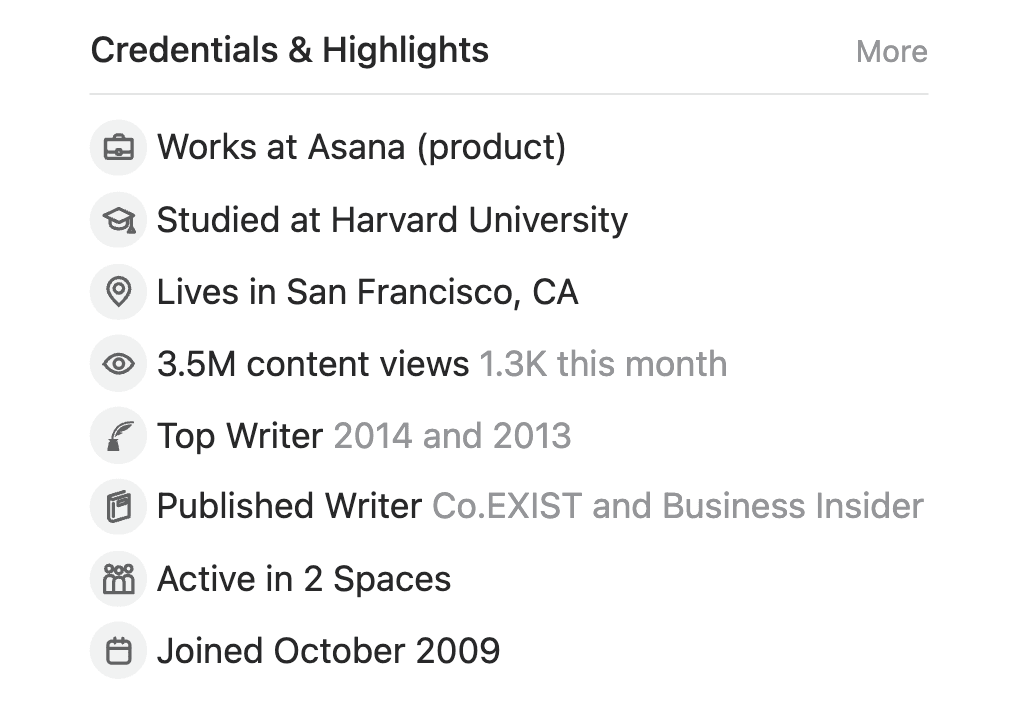
It also highlights the key topics he’s writing about:
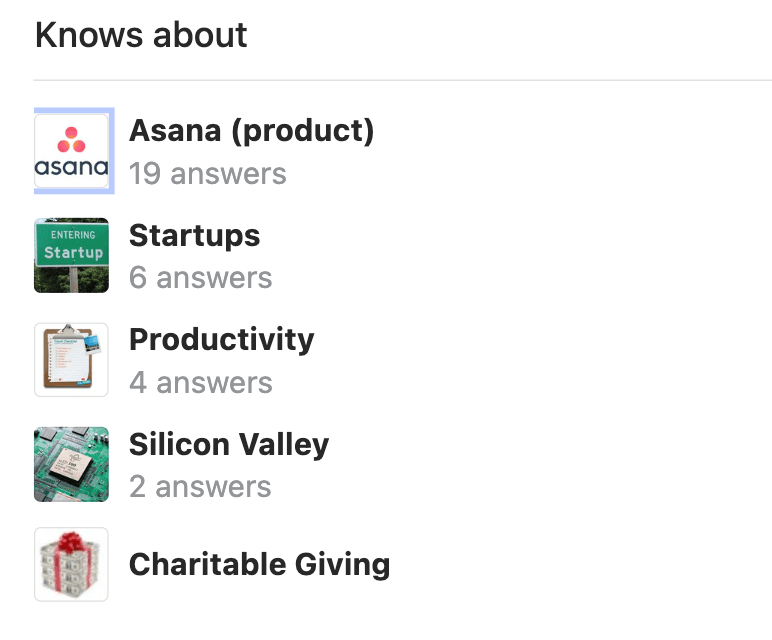
3. Explore Quora’s content structure
Next, learn how Quora organizes information to see where your expertise will have the greatest impact.
The platform organizes content in a way that creates multiple discovery paths: interconnected topics, questions, and answer threads.
When you visit any question page, you'll notice topic tags above the question (like "Marketing" or "Digital Marketing") and related questions in the sidebar.
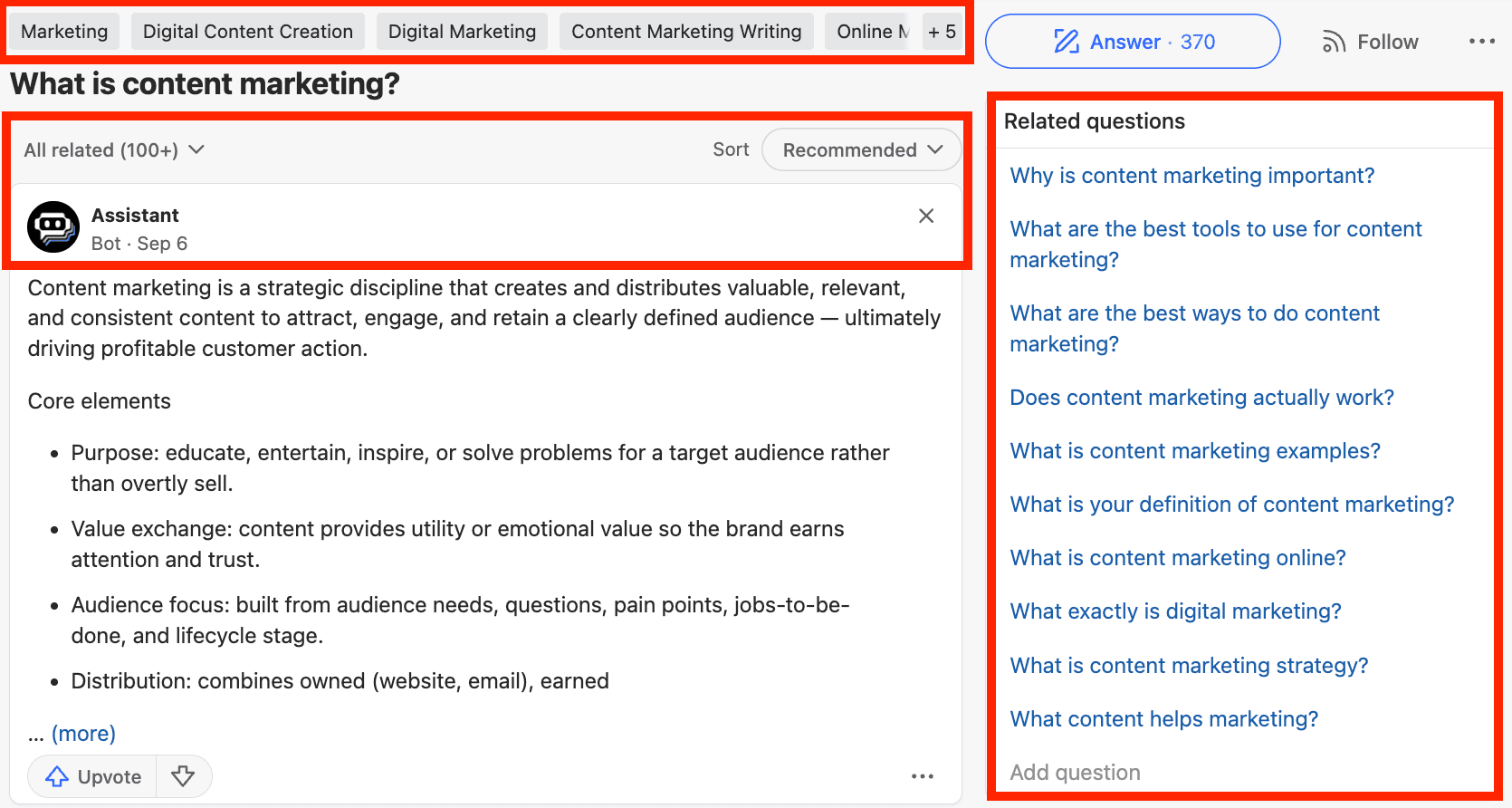
Use these navigation elements to explore connected conversations and find where your knowledge adds the most value.
4. Find relevant topics and questions to answer
From here, search for topics and questions where you can provide valuable answers and engage with your target audience.
Look for opportunities that connect with your business objectives while genuinely helping Quora users — e.g., productivity-related threads for a brand like Asana.
Use Quora's search bar to explore topics related to your industry. Type general terms like "project planning" to see what topics exist.
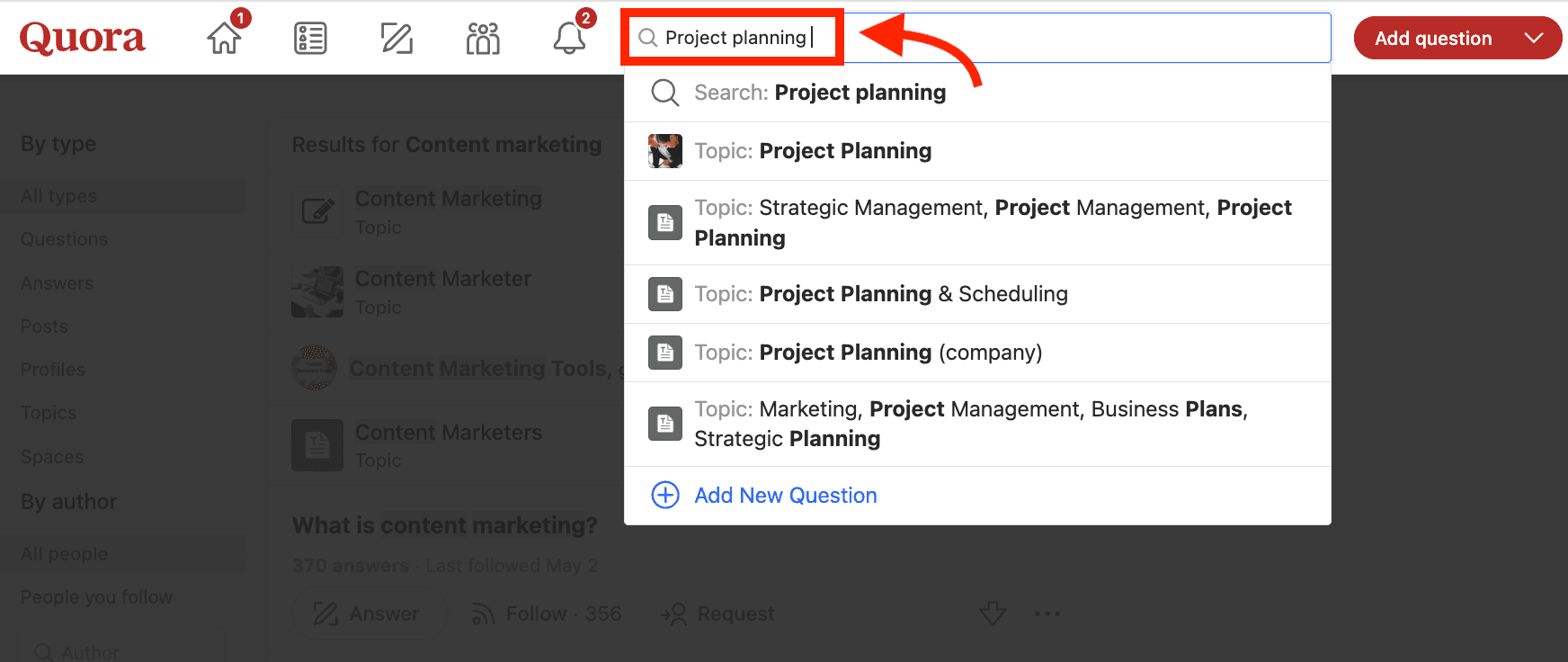
From these results, click on specific topics to drill down into more specialized areas.
This helps you discover the full range of questions in your niche.
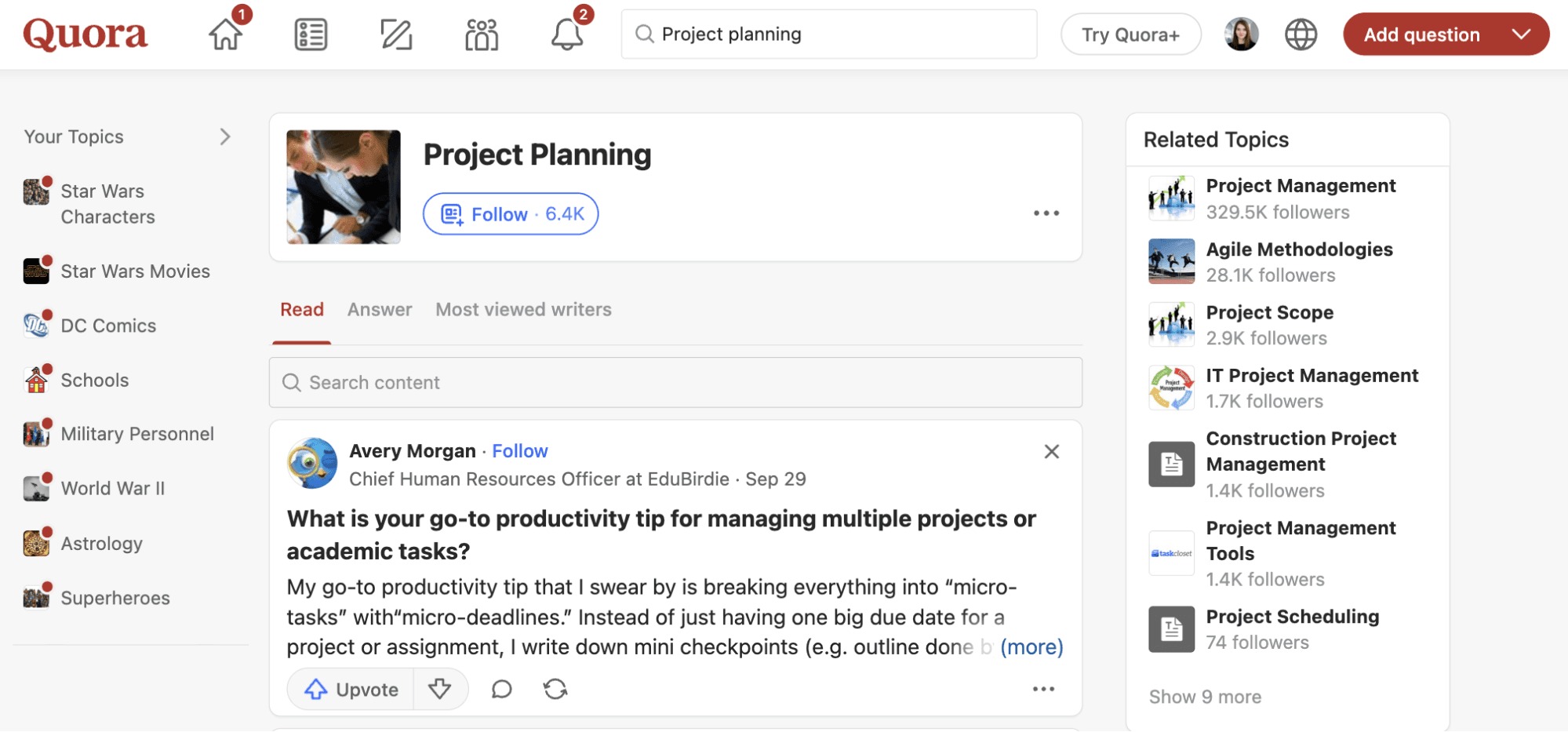
Evaluate each topic's follower count and engagement metrics to prioritize areas with active audiences.
For example, questions with recent activity typically offer better visibility, while threads with increased engagement tend to be prioritized by AI (as we’ve seen in the research).
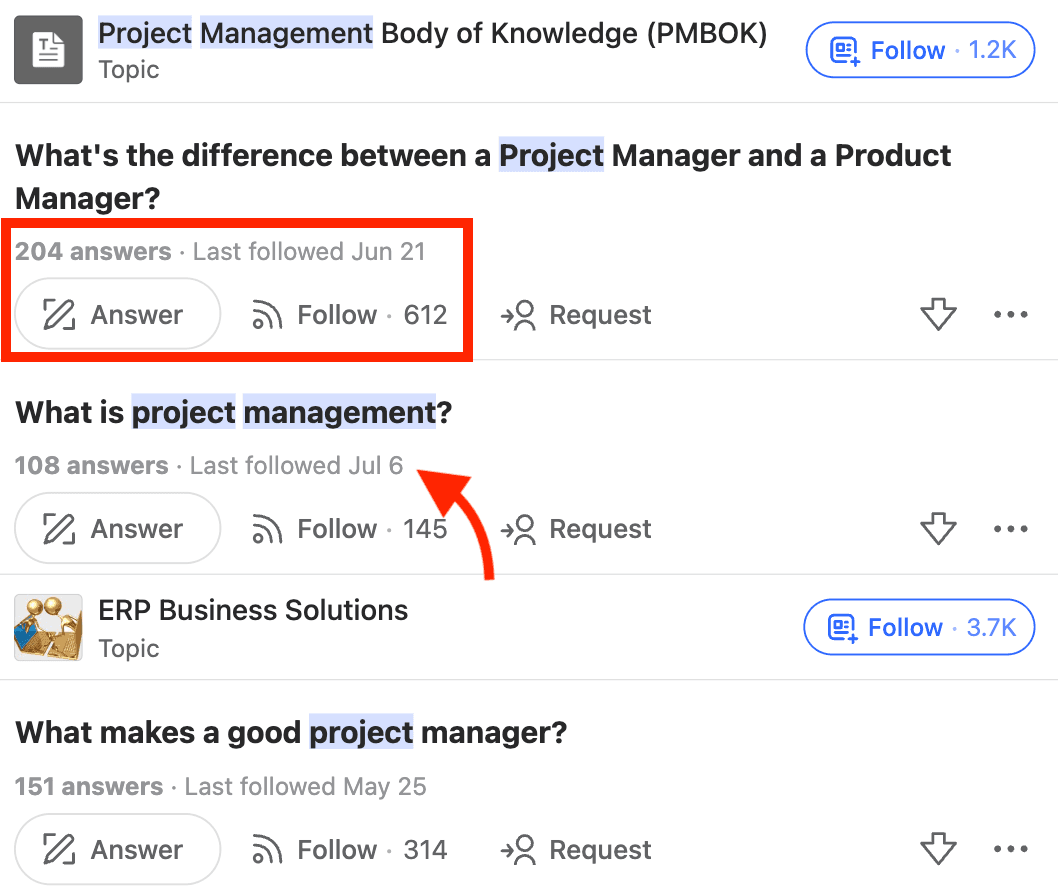
Focus particularly on high-intent questions that signal buying consideration — phrases like "how to choose," "best tool for," or "alternatives to" indicate users closer to purchase decisions.
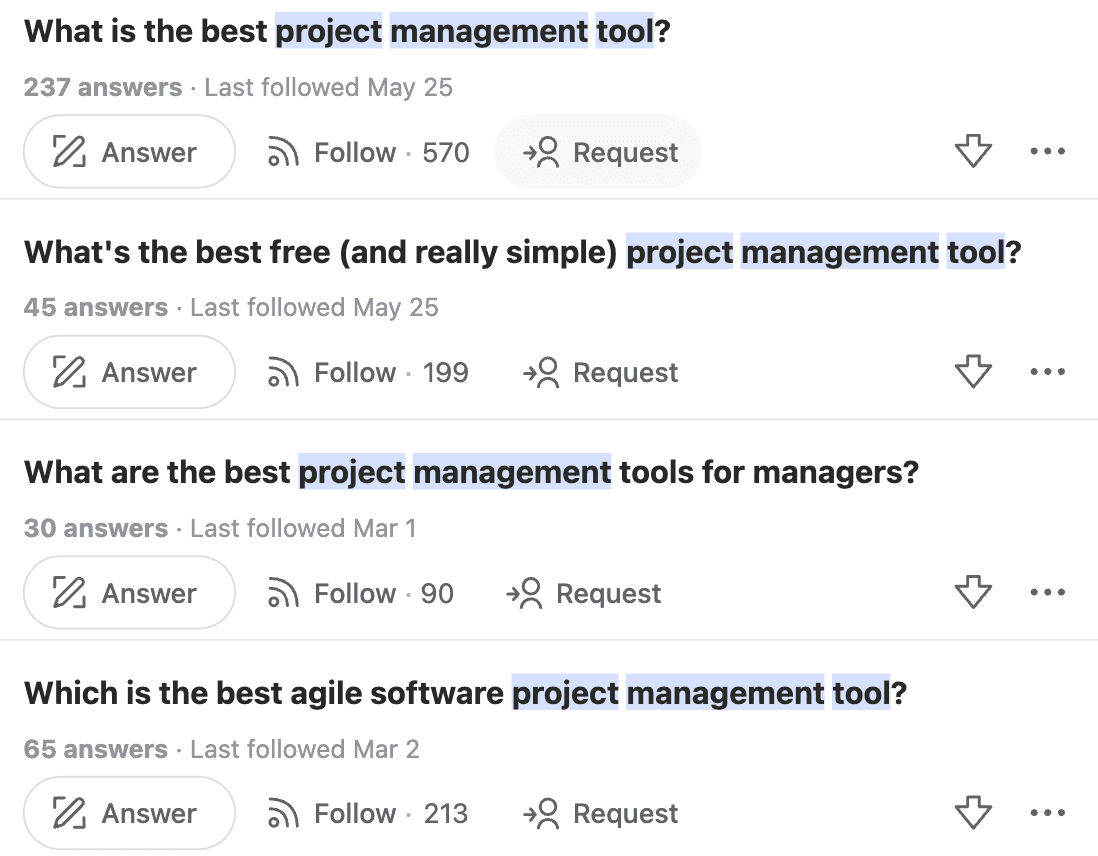
For each promising question, check the "Related Questions" sidebar to find additional opportunities and understand how users frame similar problems.
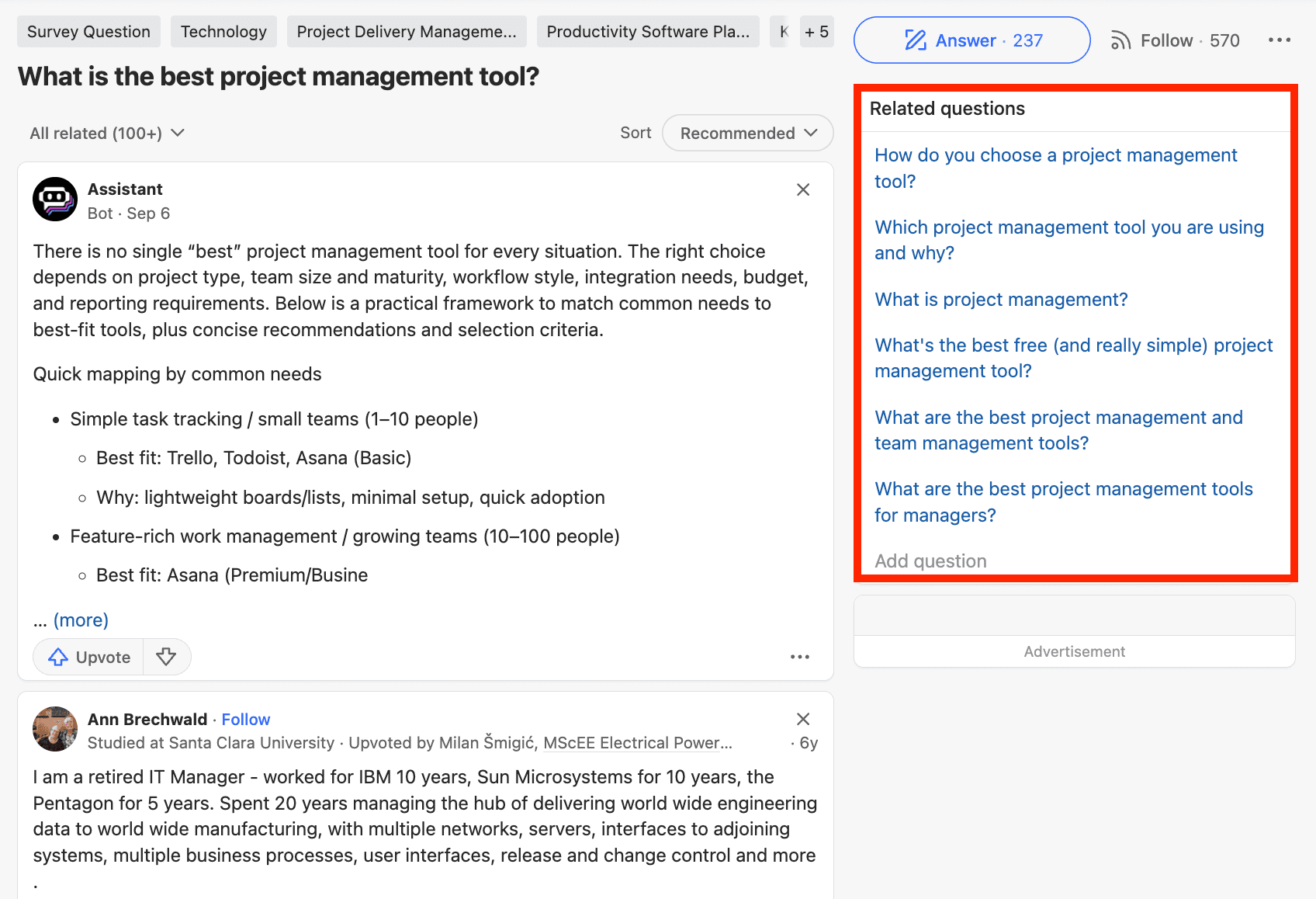
5. Ask your own questions
If your product, service, or niche isn't already represented in existing discussions, take the initiative to ask questions yourself.
This strategic approach helps you create conversation spaces where your expertise naturally fits. It can also help engage your audience and collect customer feedback.
For example, you can see that Dustin posted 34 questions, some of which are related to Asana:
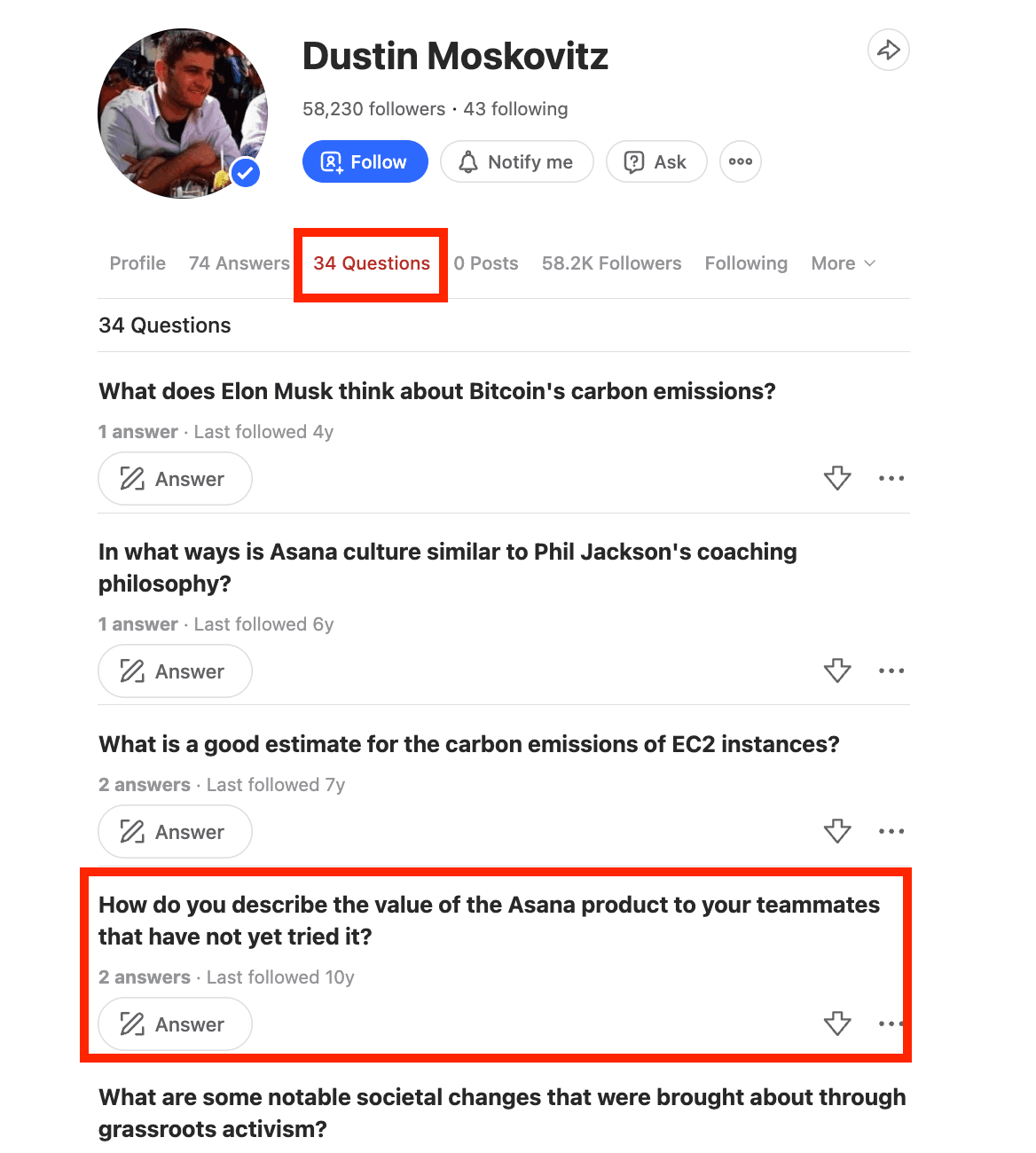
You can also use Quora's "limited" setting to avoid linking the question back to your profile; the question will still be discoverable, but won't appear in your profile's activity.
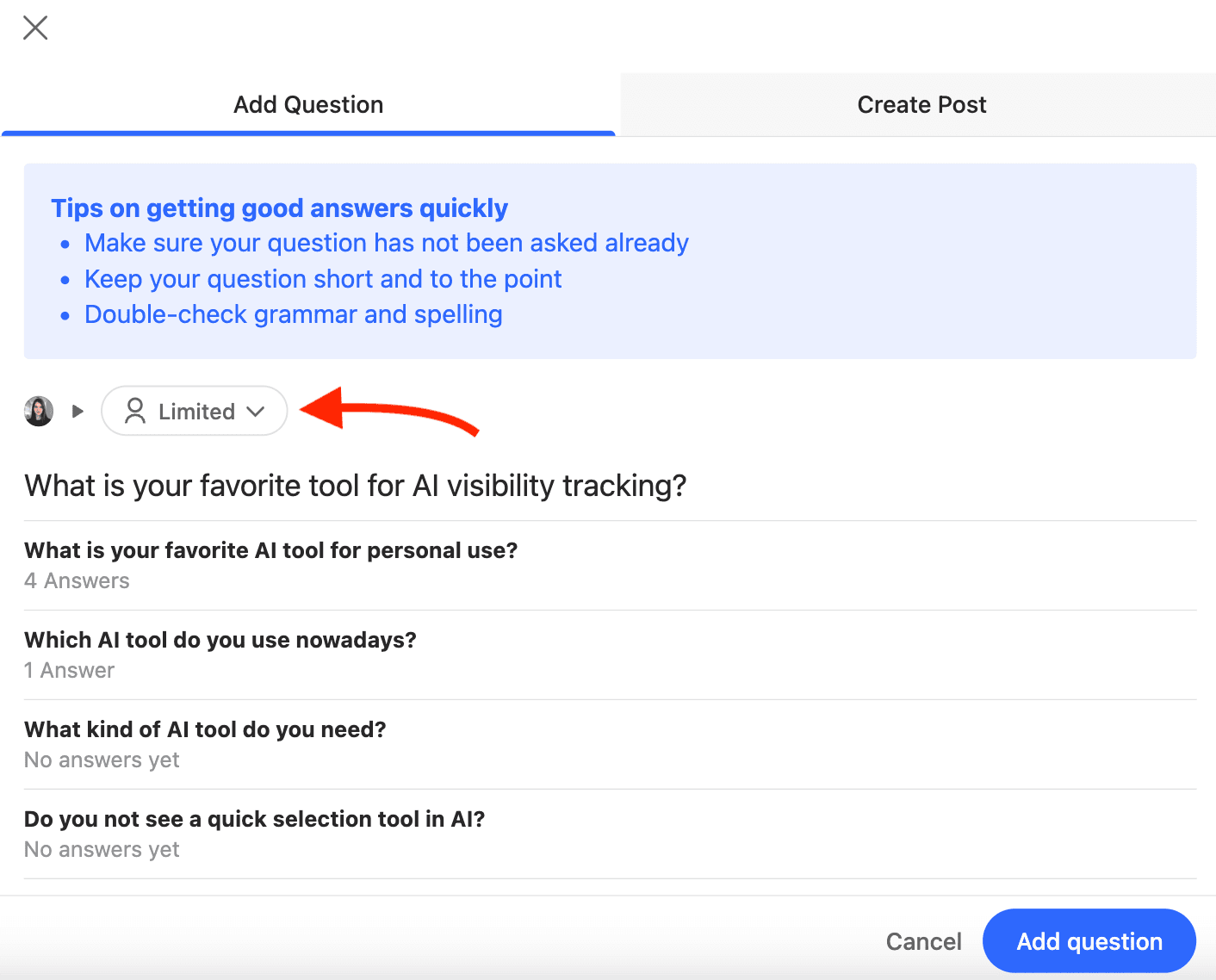
5. Write effective answers that follow Quora’s best practices
Once you’re ready to start writing answers, make sure they’re structured to favor Quora’s algorithm.
According to Jenna, effective answers are direct, credible, helpful, easy to read, and supported by real-world experience.
Here’s how it works:
Begin by addressing the question within the first few sentences.
If the topic is complex, provide a TL;DR summary at the top. This approach signals relevance to both readers and algorithms.
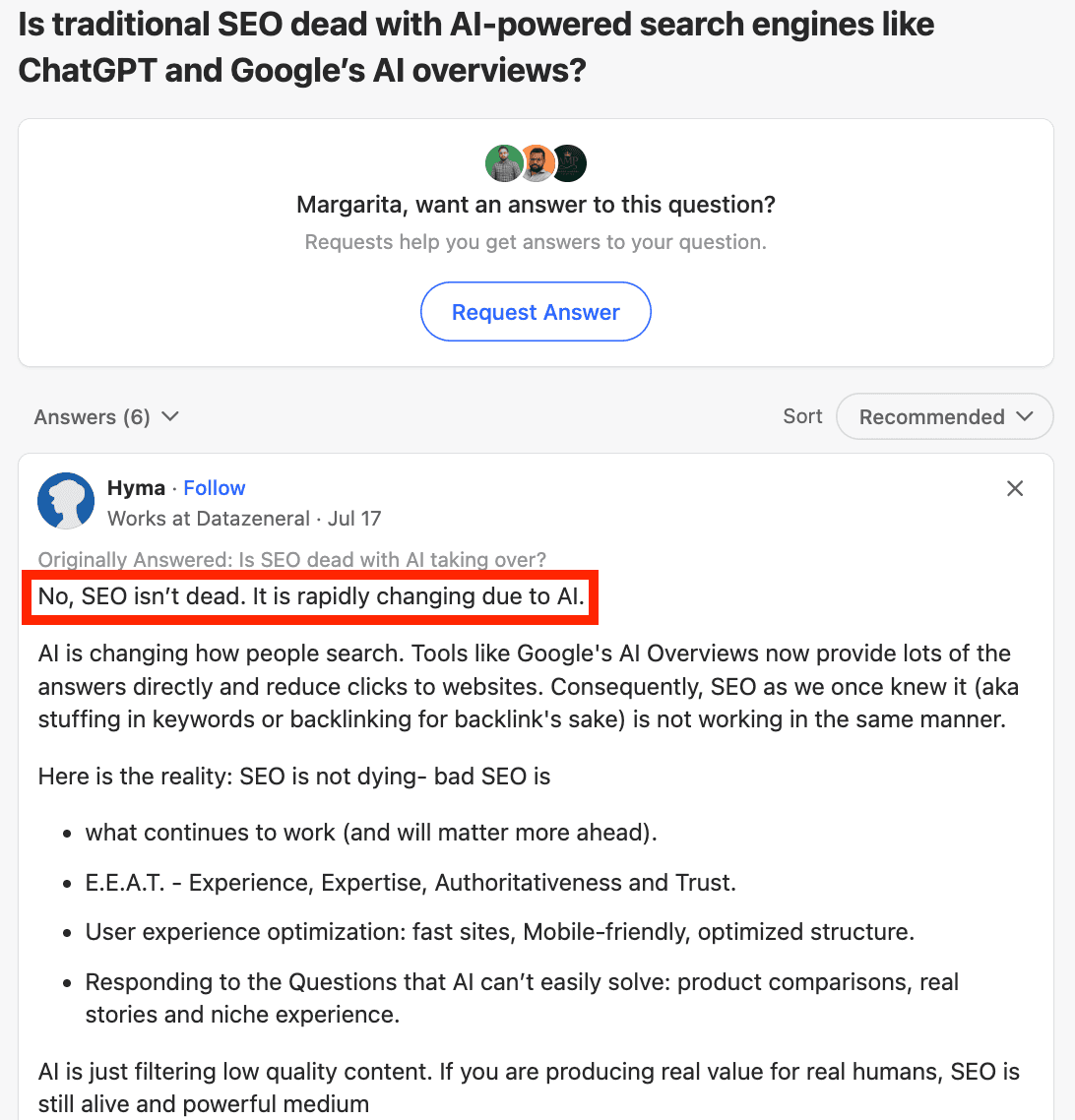
Then, explain why you are qualified to answer by referencing your professional experience, credentials, or relevant personal stories.
This establishes credibility and helps readers trust your perspective.
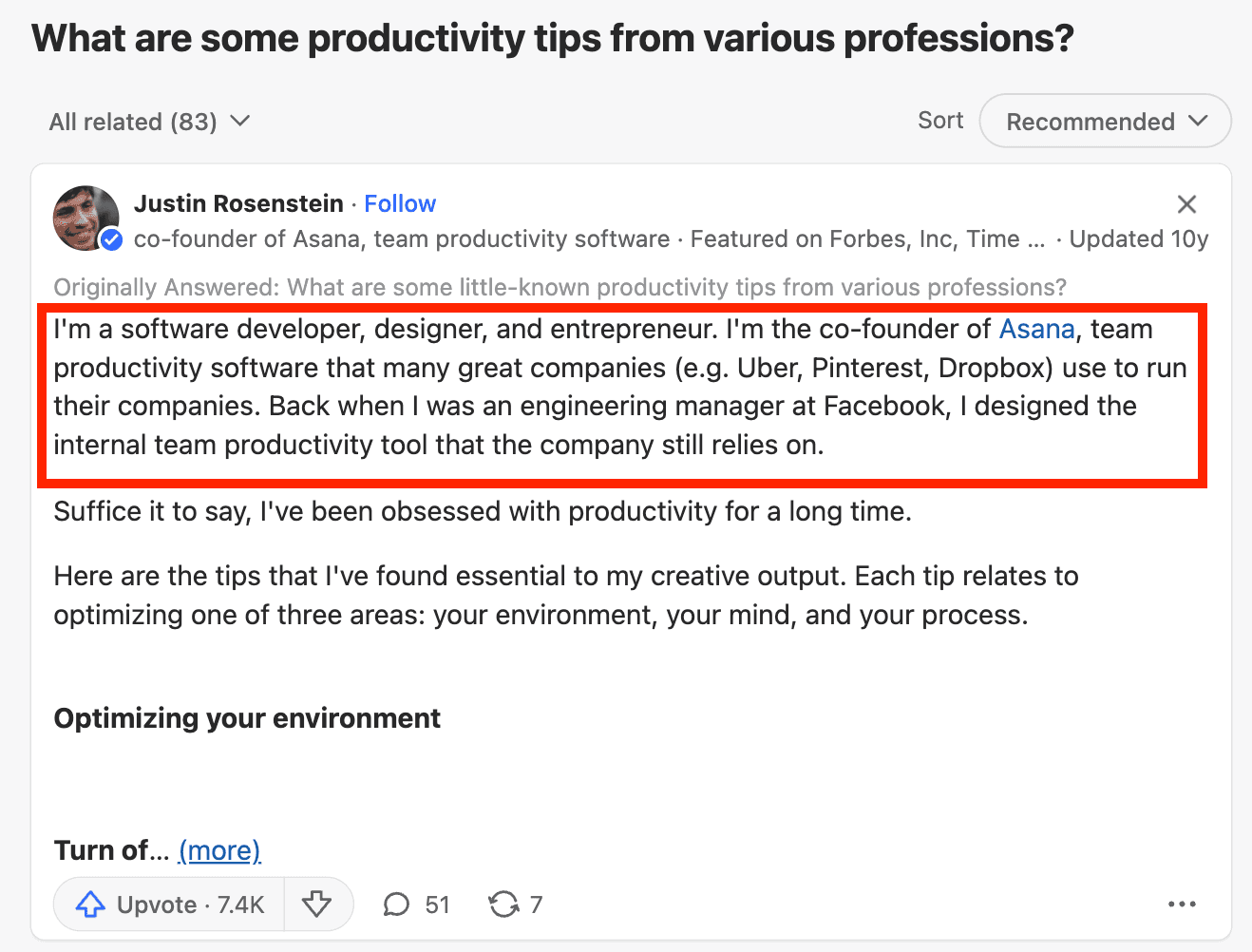
Then, follow the 80/20 rule: dedicate 80% of your answer to genuinely helpful information and limit product or business references to about 20%.
This balance maintains authenticity while still creating brand awareness.
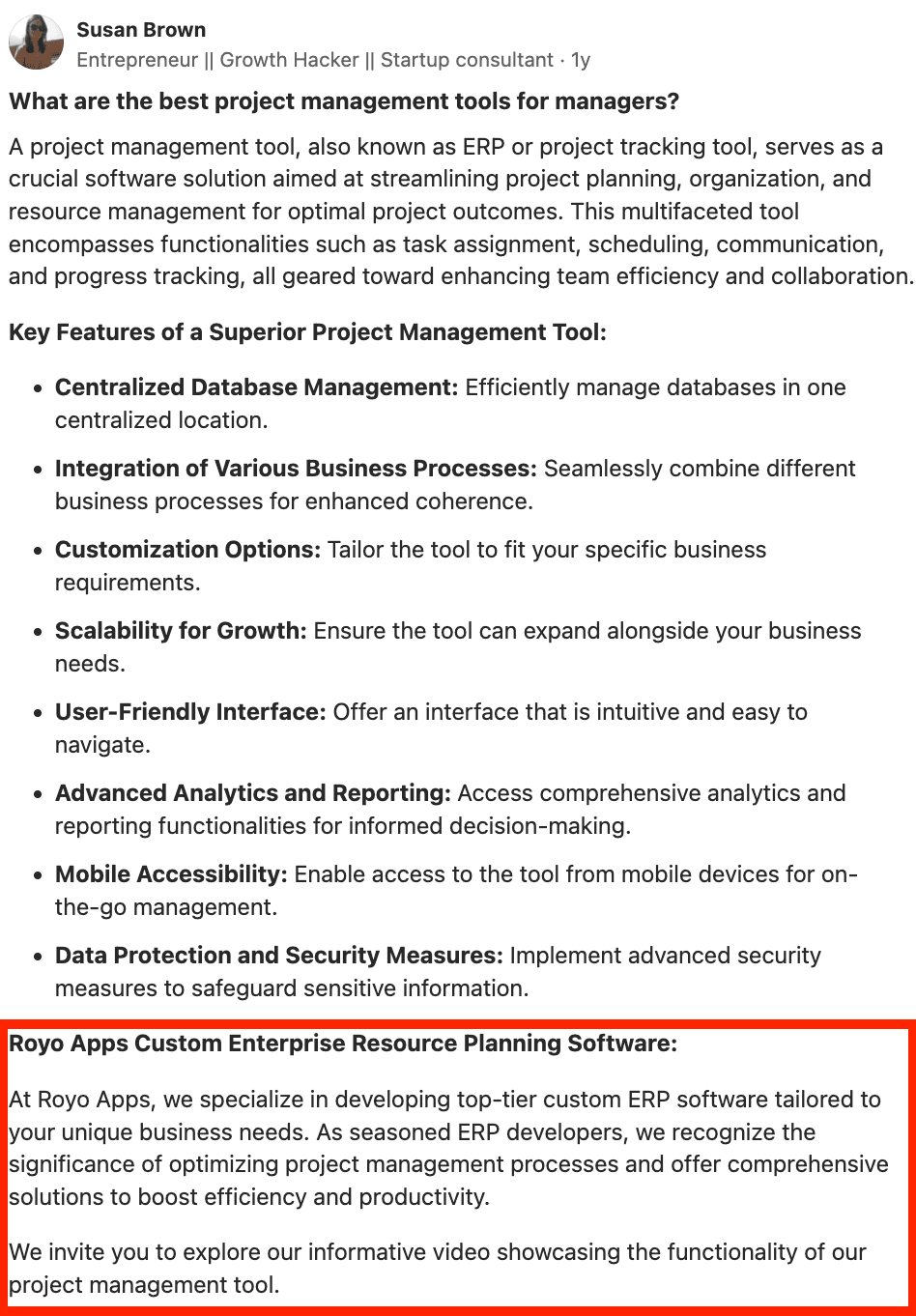
It’s also a good idea to format your answer for readability with short paragraphs, bullet lists, and strategic bold/italic text.
Keep answers around 500 words when possible; for longer responses, use section headings or numbered steps to maintain clarity.
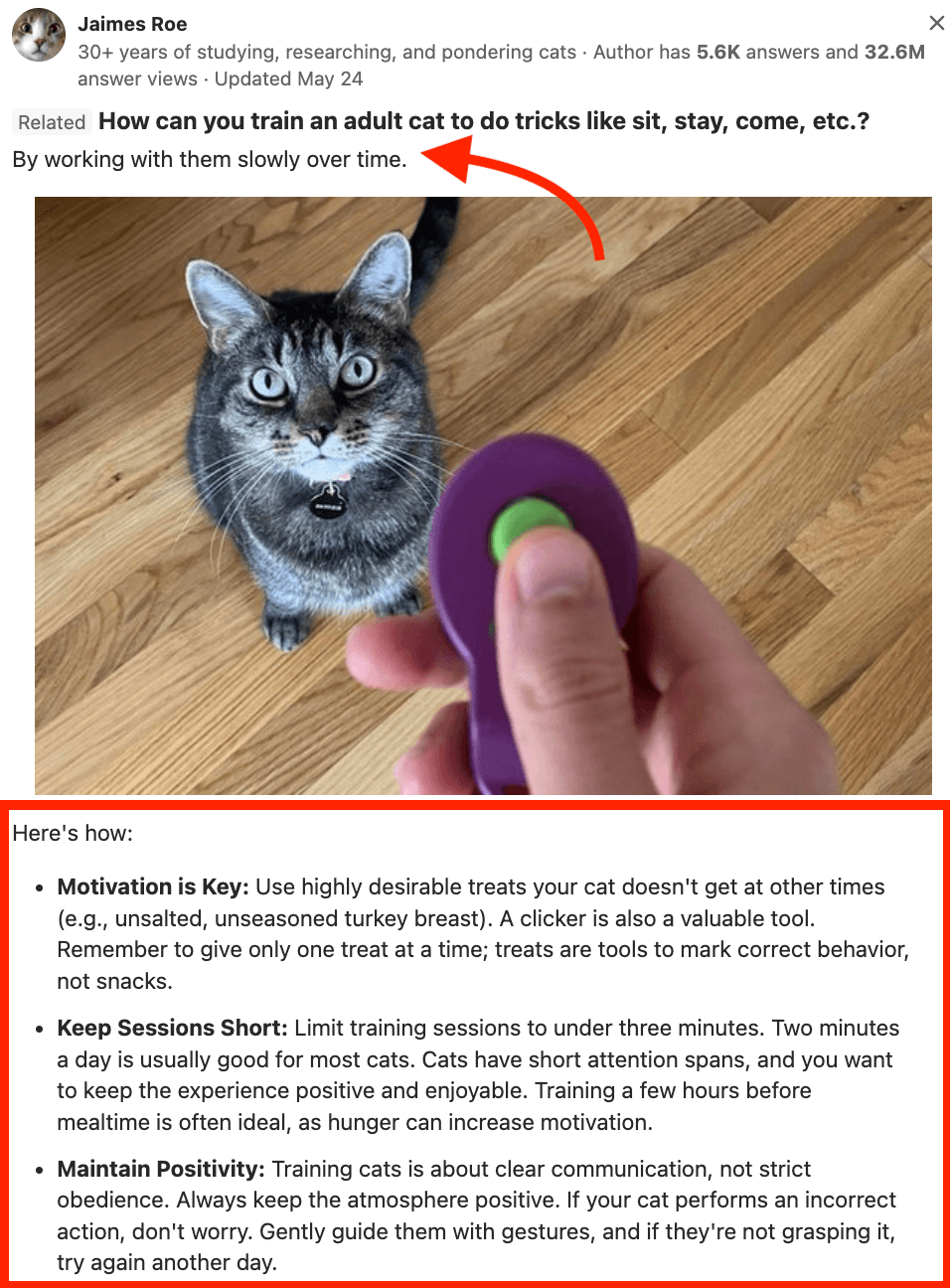
Finally, include helpful hyperlinks to authoritative sources or your own supporting content whenever they add value. These references strengthen your answer while creating natural pathways back to your website.
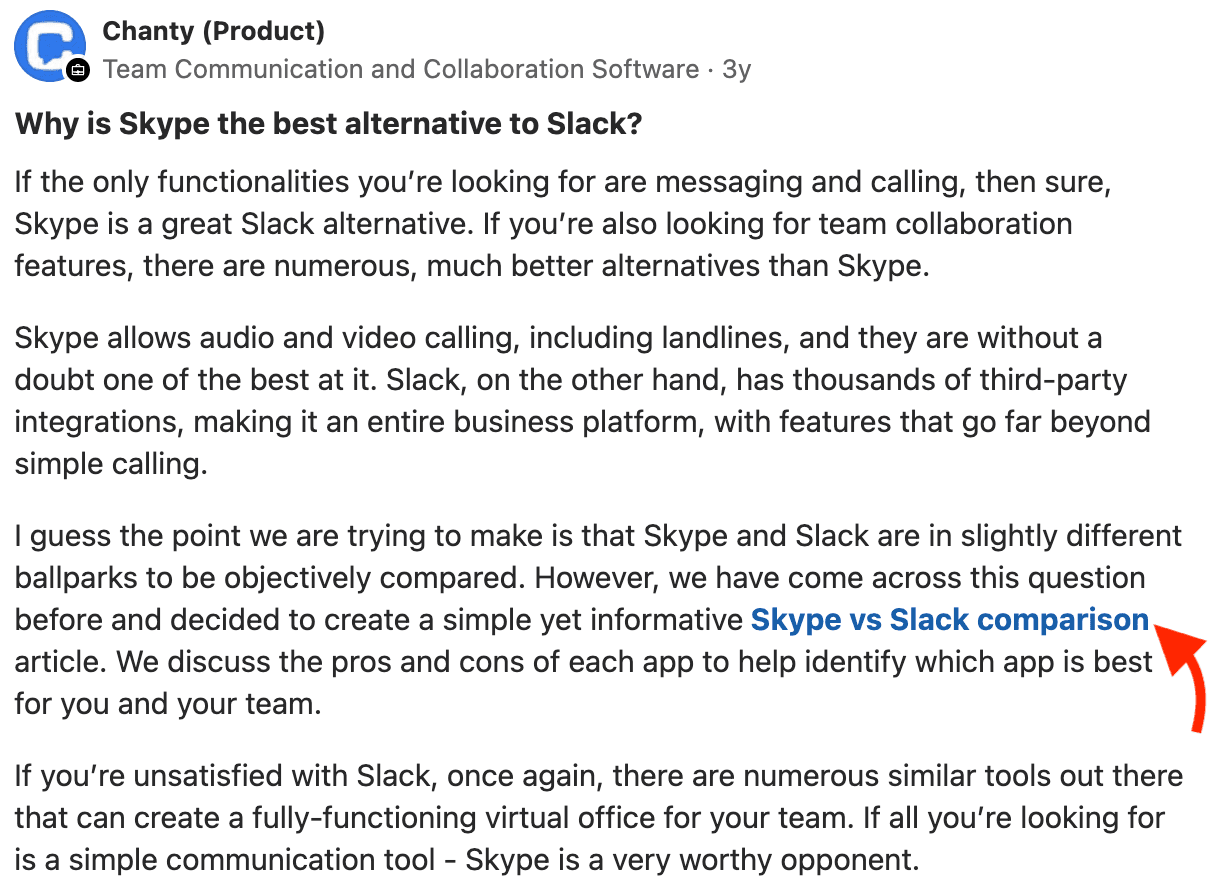
Let's look at two different approaches to the same Quora question to see these principles in action:
Question: What's the best email marketing software?
Basic answer:
There are many email marketing tools available. Our company offers an email marketing solution with AI capabilities and industry-leading deliverability. We have excellent open rates and customer service. You should check out our free trial on our website.
Explanation:
This answer is promotional without offering real value. It makes generic claims without supporting evidence and doesn't establish any credibility.
Effective answer:
Long story short: The "best" email marketing software depends entirely on your specific needs
As Director of Email Marketing at EmailPro for the past 8 years, I've tested over 20 different email platforms across various industries.
In general, here are the tools you should go for depending on your context:
- For small businesses focused on growth, MailerLite or ConvertKit offer simplicity and affordable pricing tiers.
- Mid-sized businesses with advanced segmentation needs often do well with EmailPro’s AI platform.
- Enterprise companies typically need solutions like Marketo or Salesforce Marketing Cloud.
The key factors aren't features but:
- How well it integrates with your existing tech stack
- Whether the reporting matches your specific KPIs
- Ease of use for your specific team.
At EmailPro, we built our platform specifically for businesses that need advanced segmentation without enterprise complexity. Our solution works particularly well for businesses with 10K-100K subscribers, but I recommend evaluating all options based on your specific needs.
Explanation:
This answer starts with a direct response, establishes the writer's expertise, offers a nuanced perspective with specific scenarios, and includes limited self-promotion that's relevant to the context.
6. Repurpose your existing content to reuse on Quora
You can also repurpose the content you’ve already created and approved to build your Quora presence.
That’s a real lifesaver if you’re in a regulated industry or just short on time — you already have vetted messaging and data, so why not put it to work on a new channel?
Start by adapting your existing blog posts, FAQs, white papers, research, podcasts, or webinars into Quora answers.
Pull out the most relevant snippets and add a bit of context to make them fit the exact question being asked.
For instance, your existing comparison pages or product-focused articles can be great sources for answering product-related questions:
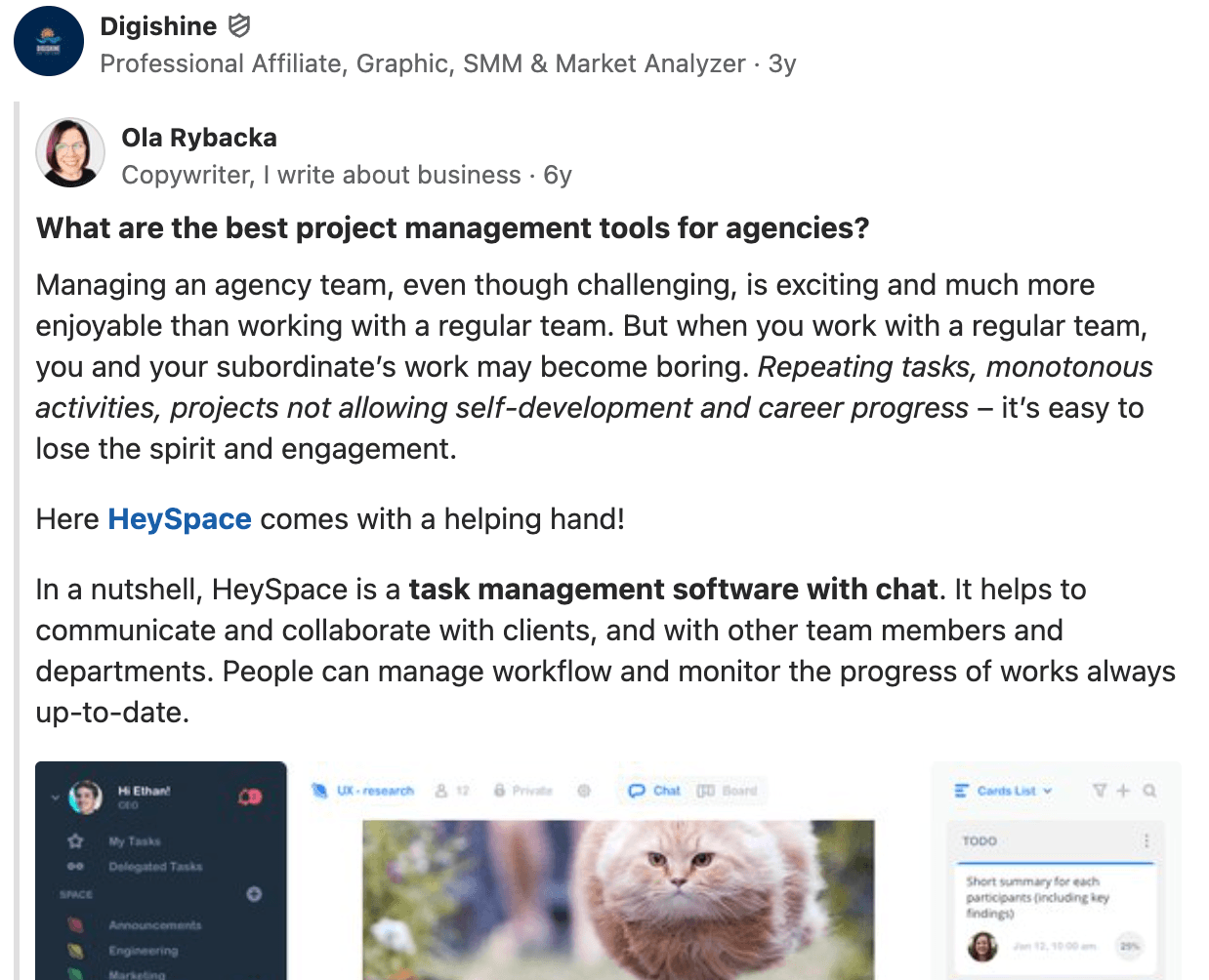
7. Encourage replies and join active threads
Create active discussions around your answers and participate in existing high-engagement threads to maximize your visibility potential.
Remember: Higher engagement, such as more answers, comments, and upvotes, correlates with increased chances of appearing in Google's AI search features.
Here’s what you can do:
- Prioritize threads with high engagement: Look for questions with existing and recent answers (that said, I’d still recommend tackling high-intent questions even if the engagement is low)
- Aim for quality over quantity: A well-crafted answer that sparks conversation is better than ten generic posts.
- Ask a question at the end of your answer to invite differing perspectives: This simple technique can increase comment rates and keep your thread active.
- Respond to comments promptly and link to related Quora answers to keep the thread active: This cross-linking creates a network effect that benefits all your content.
For instance, detailed, well-argumented answers like the one below tend to generate more organic engagement:
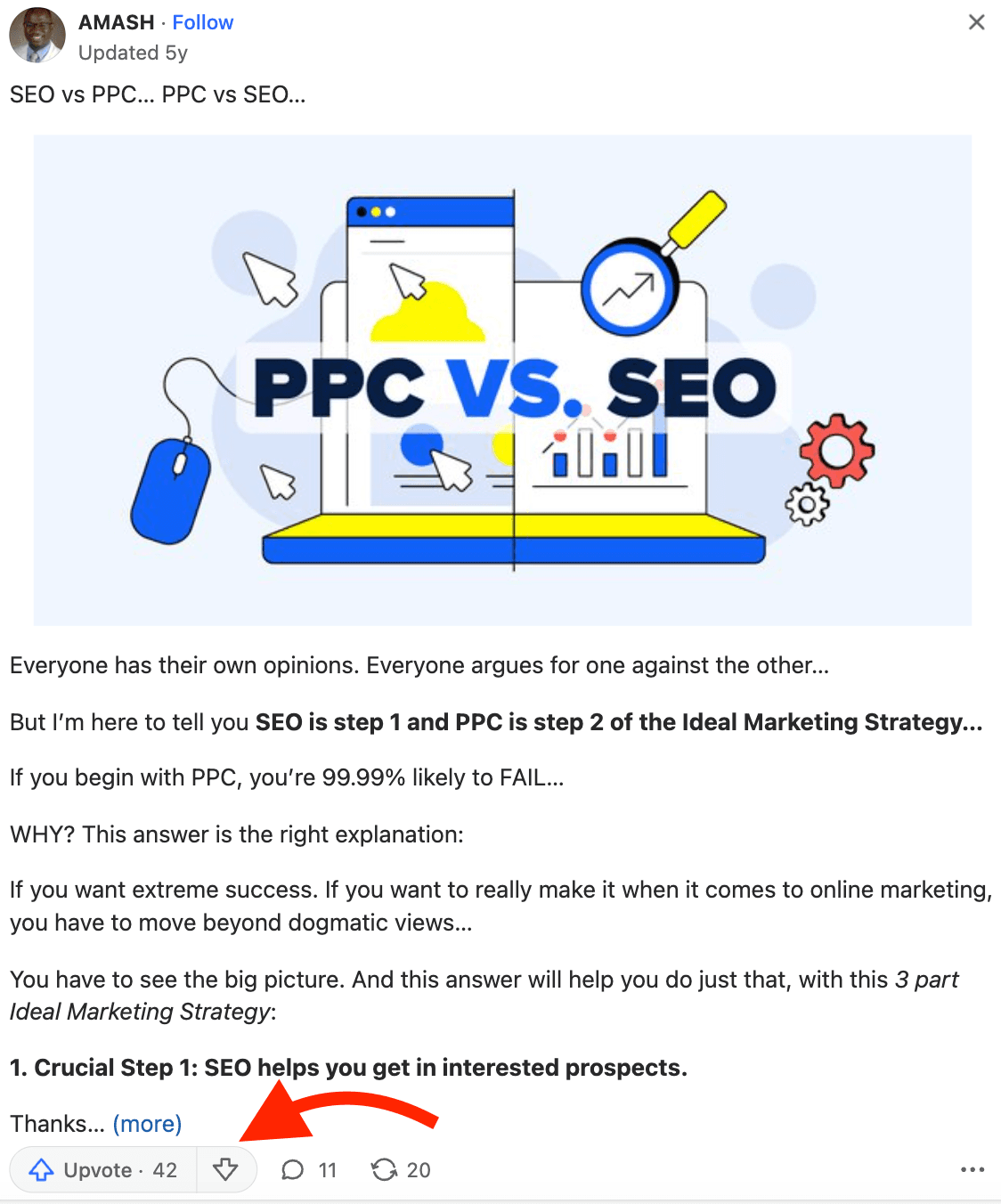
You can also use Promoted Answers (Quora's native ad format) to boost visibility once you have a strong piece of content.
This paid amplification can accelerate organic engagement, creating a positive feedback loop.
For example:
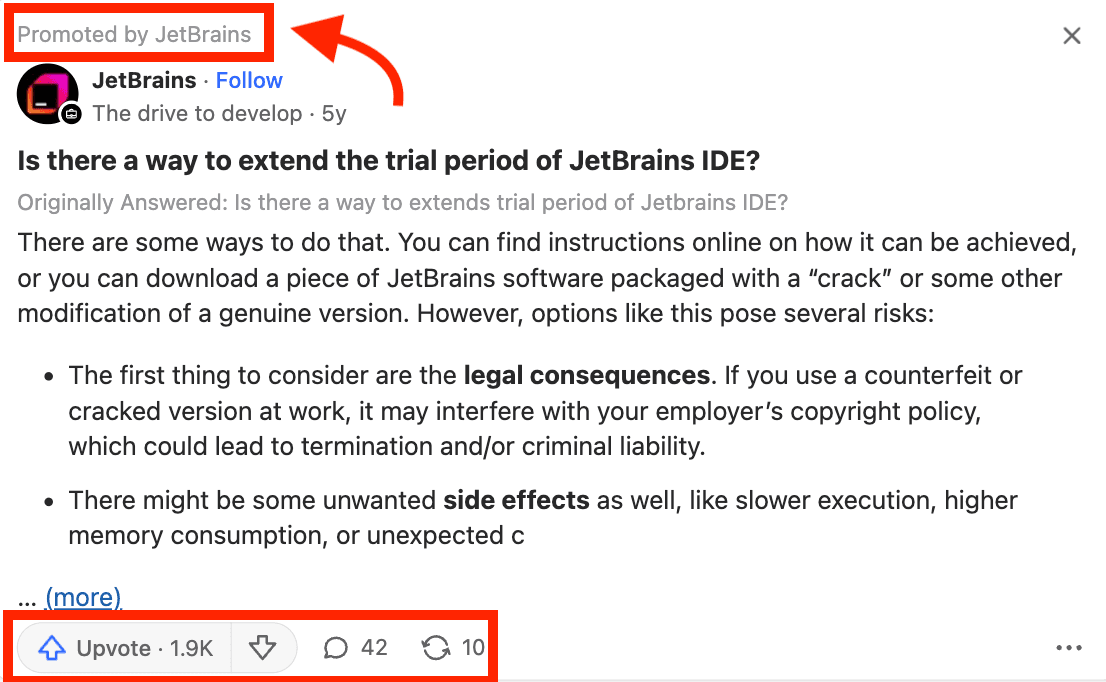
8. Track relevant AI Mode citations
Finally, monitor which Quora threads about your brand or industry are being cited in Google’s AI search results.
Use Semrush's AI SEO Toolkit: Open the "Brand Performance" report and choose Google AI Mode as the focus AI platform.
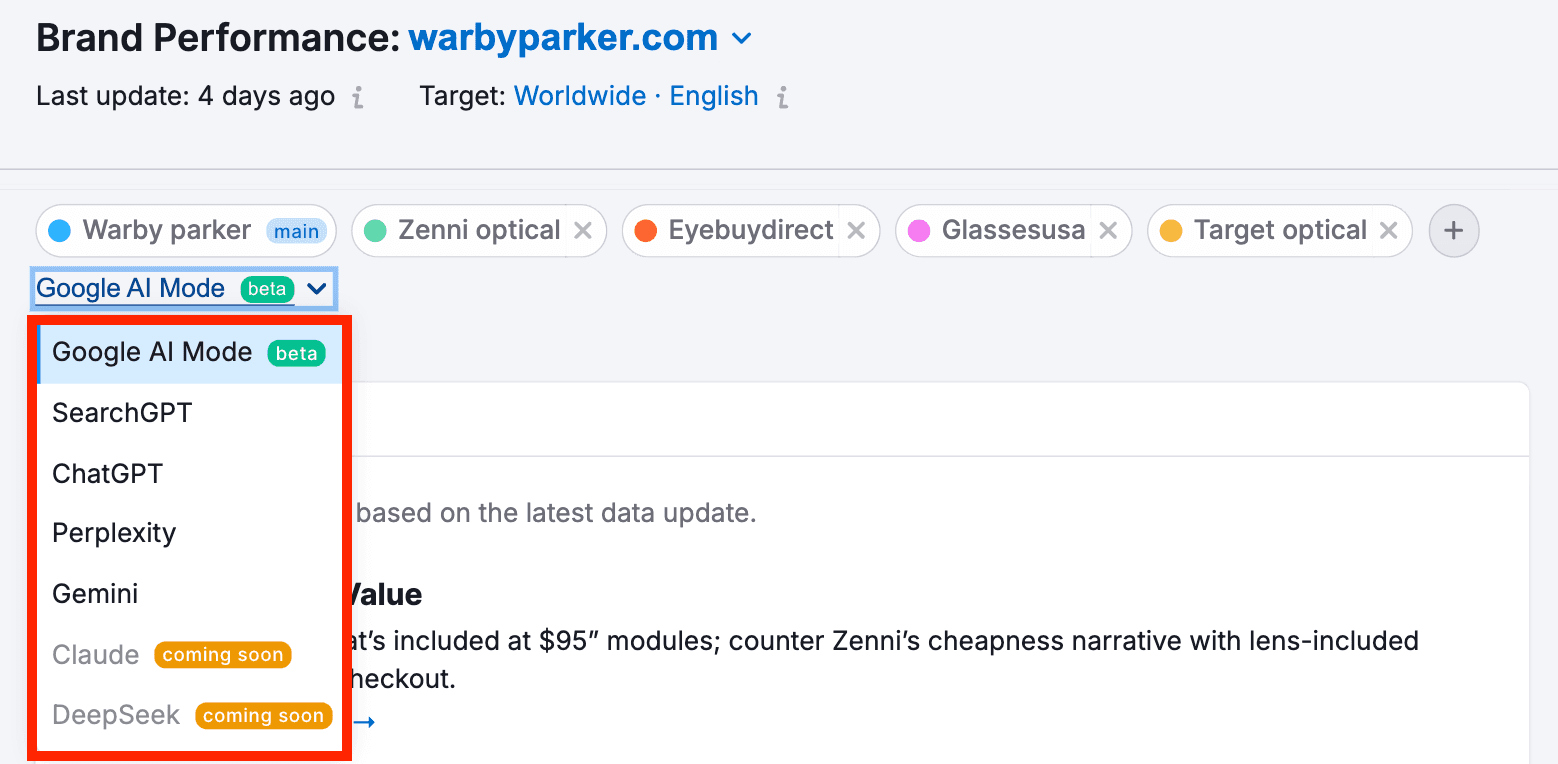
Then, navigate to "Narrative Drivers,” scroll to "Citations," and choose between branded or non-branded queries.

From here, select "Cited Pages" and enter "quora.com" to filter specifically for Quora citations.
Check the specific threads, see whether they also mention your competitors, and analyze the overall sentiment.
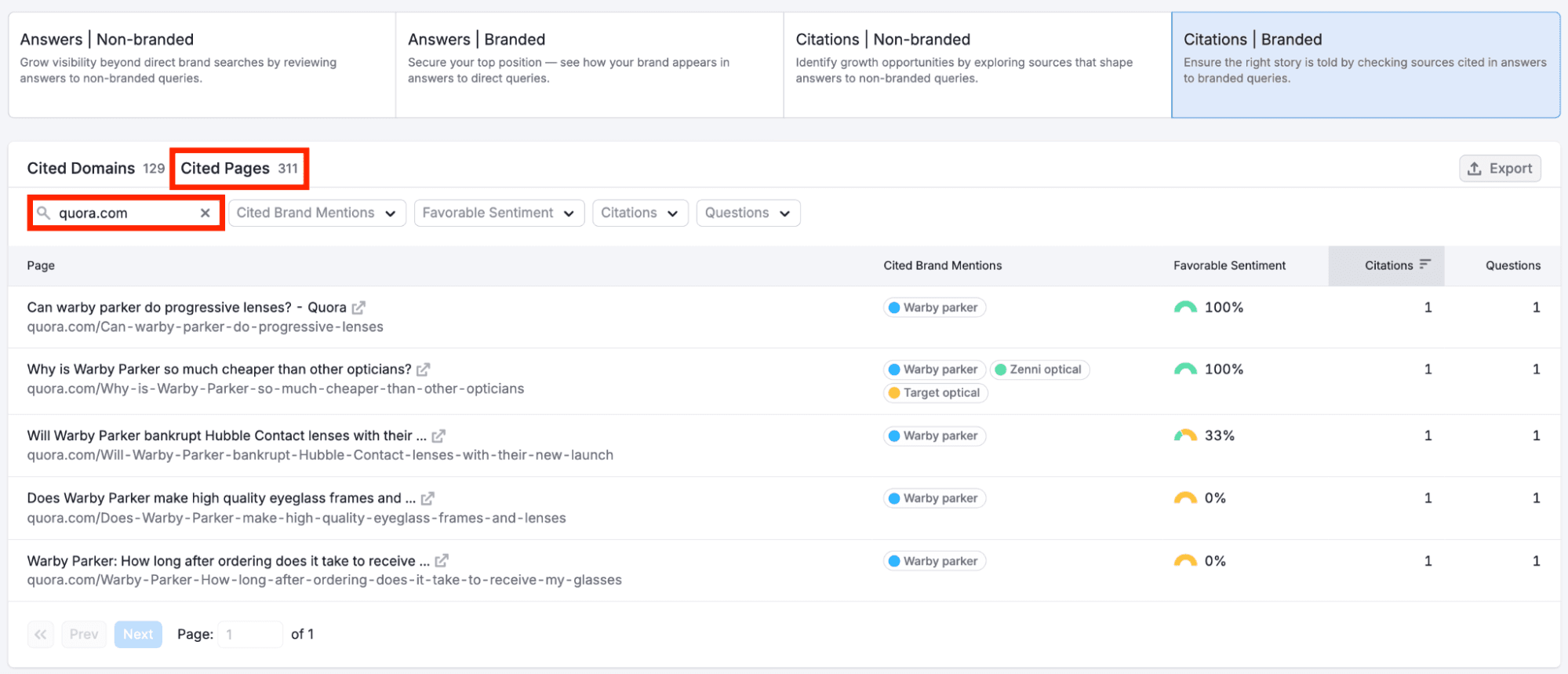
Use these insights to focus your Quora strategy on high-impact threads, create content that fills visibility gaps, and monitor how AI systems represent your brand across different query types.
Building AI visibility through community platforms
Community-led platforms like Quora are a gateway to Google’s AI search ecosystem and authentic user engagement.
The difference comes down to creating content worth citing — just like everything else in modern content marketing, if you ask me.
Here’s what you need to succeed:
- Show up with real insights. Share genuine expertise from your experience rather than generic advice or marketing messages.
- Keep the conversation going. Engage with comments, ask follow-up questions, and build active discussions around your answers.
- Be uniquely you. Focus on your specific perspective, brand values, and real-world experience.
The core principle stays the same, whether you’re posting on Quora or anywhere else: brands that provide real value will stay visible, no matter how the algorithms change.
Stay ahead of the AI search curve.
Subscribe to the Relato newsletter for actionable playbooks that make your content more visible to humans and machines.